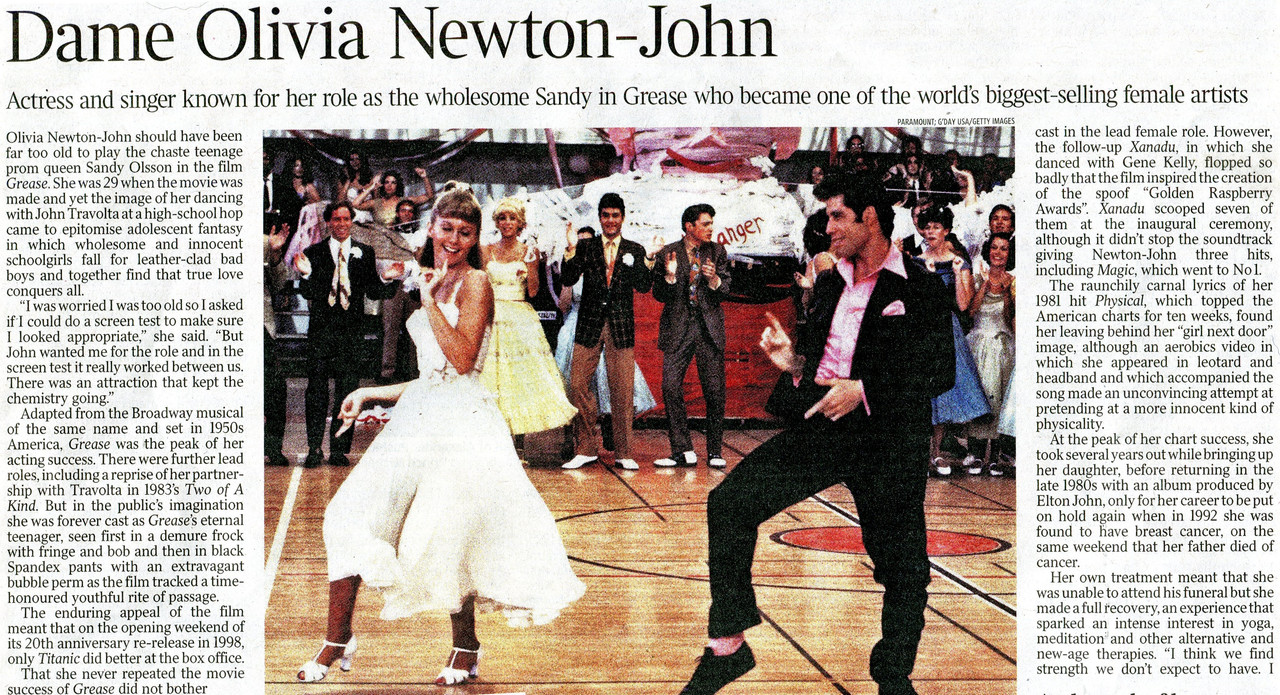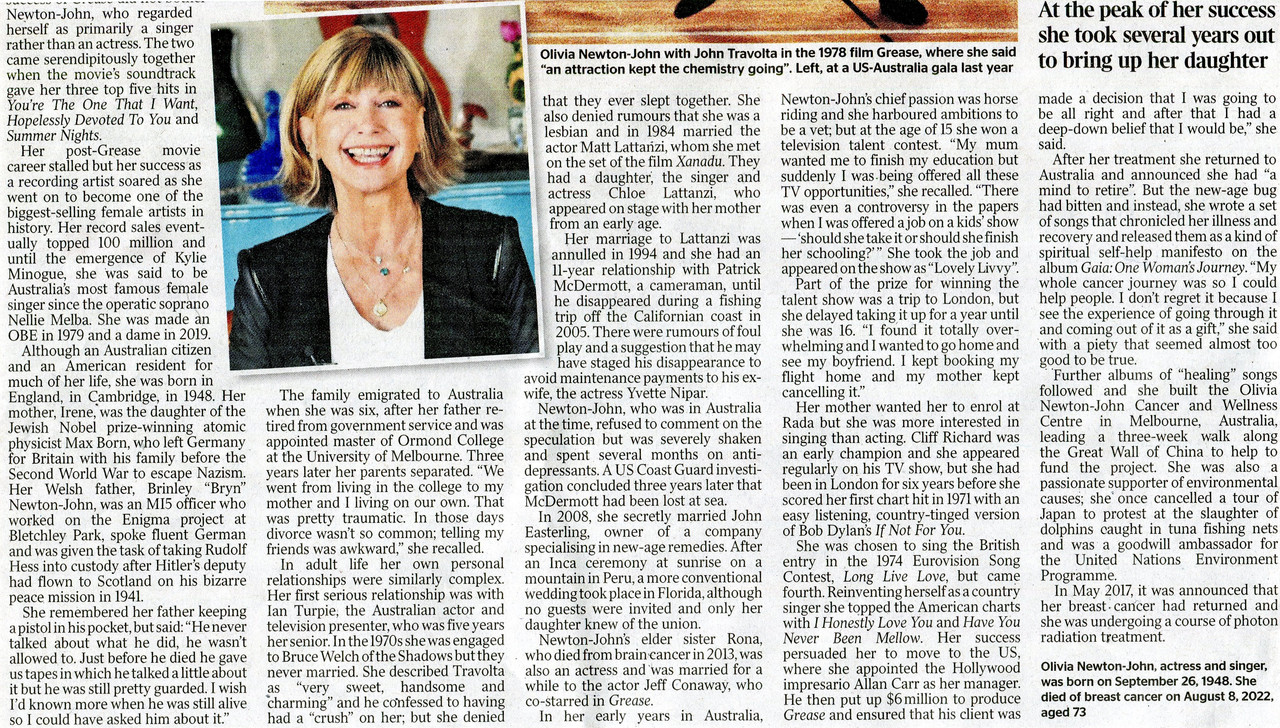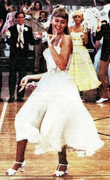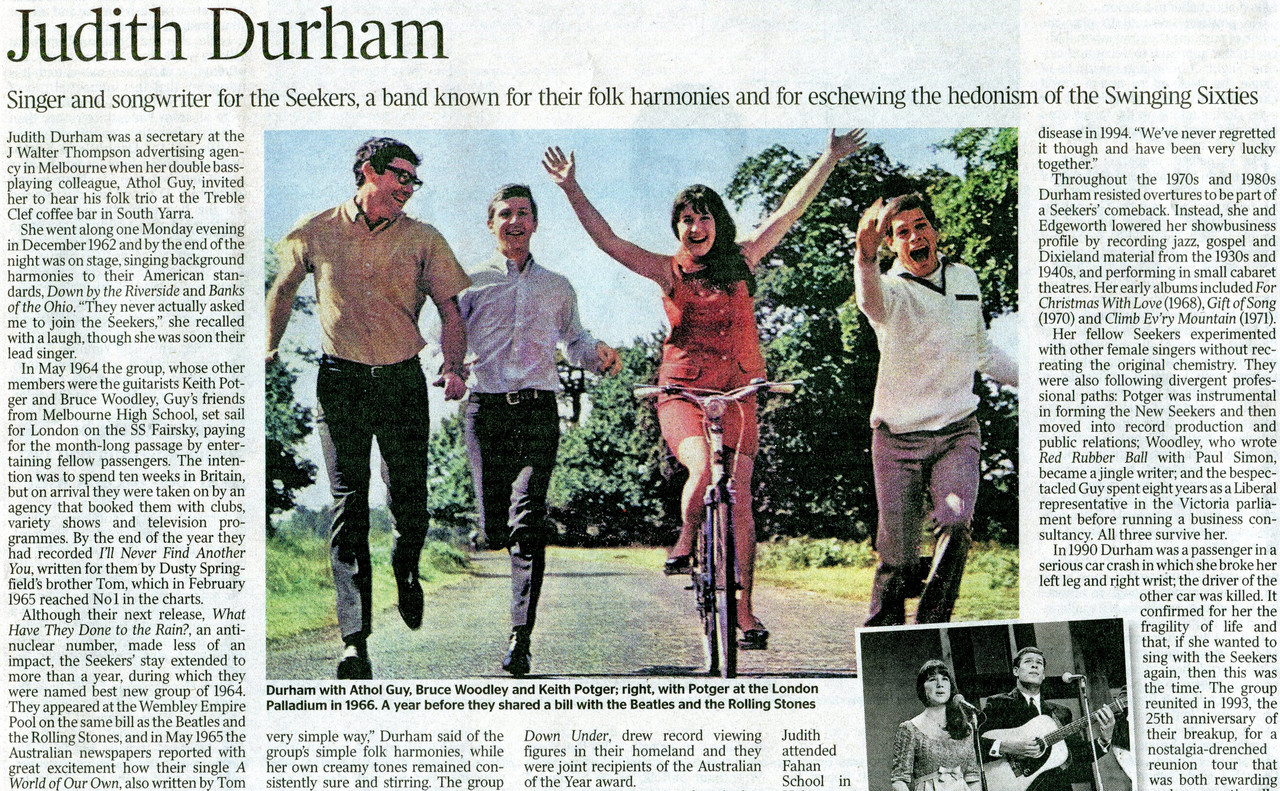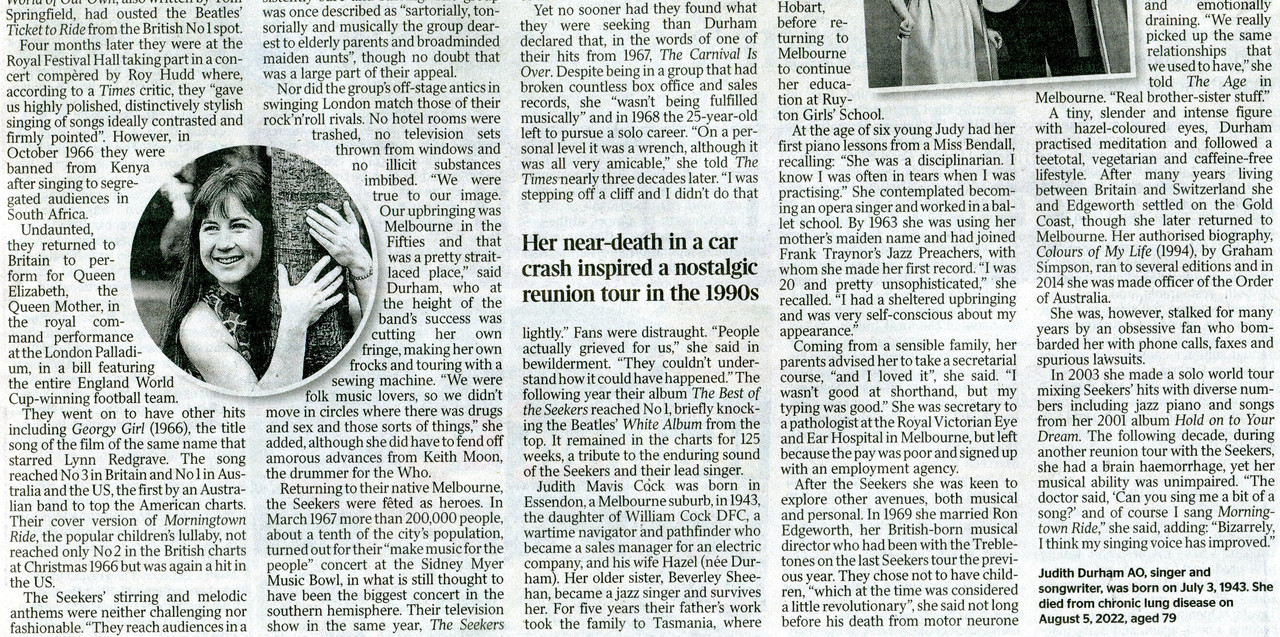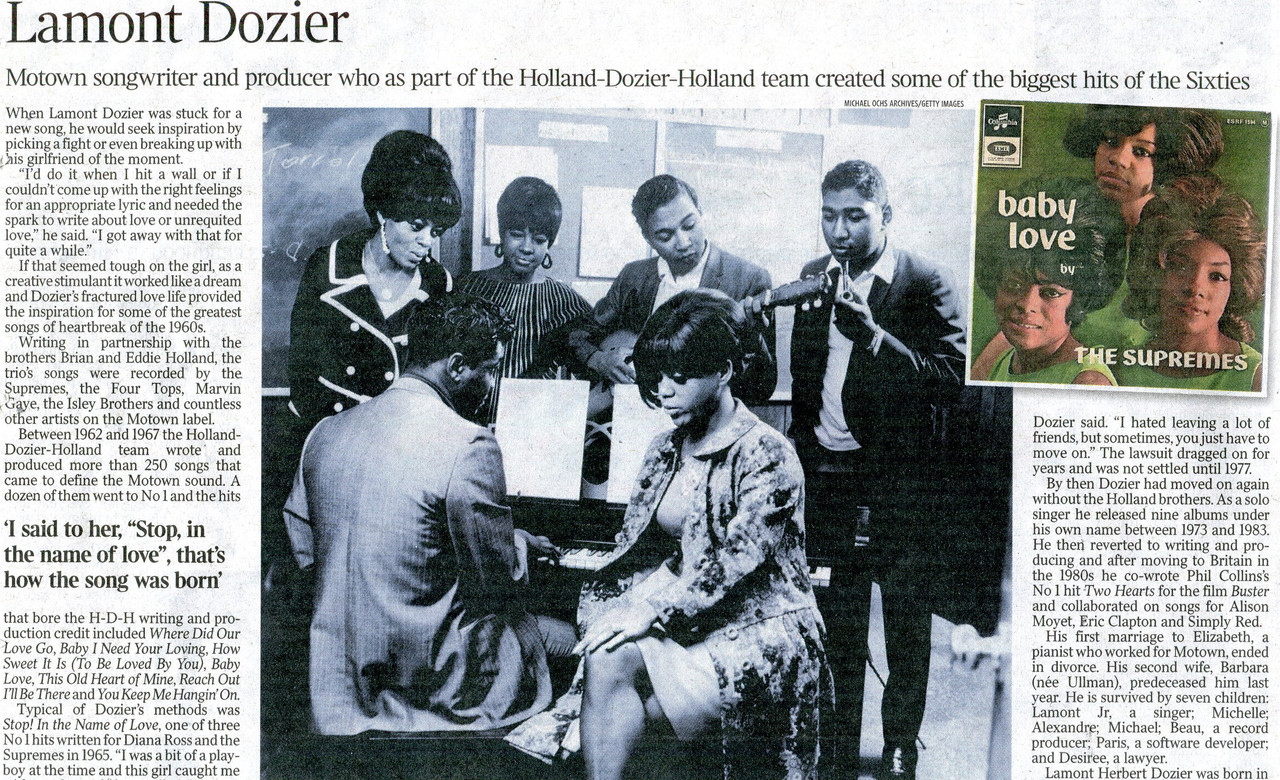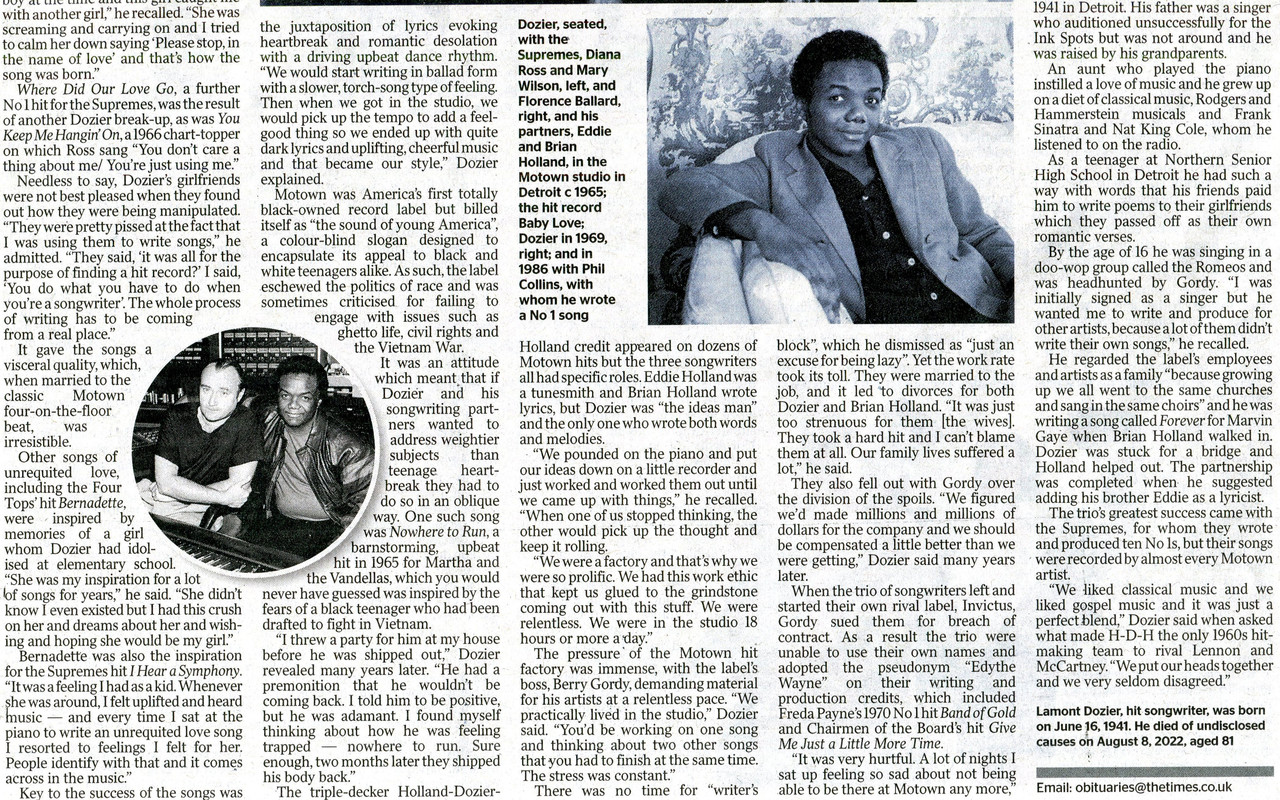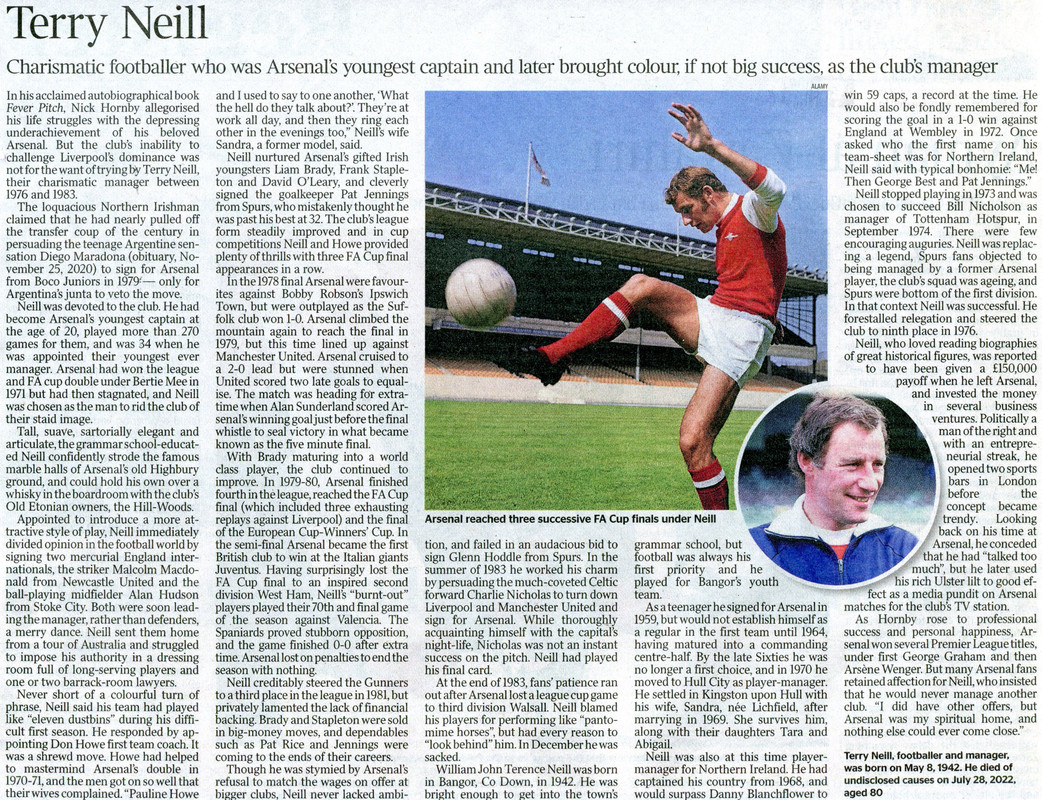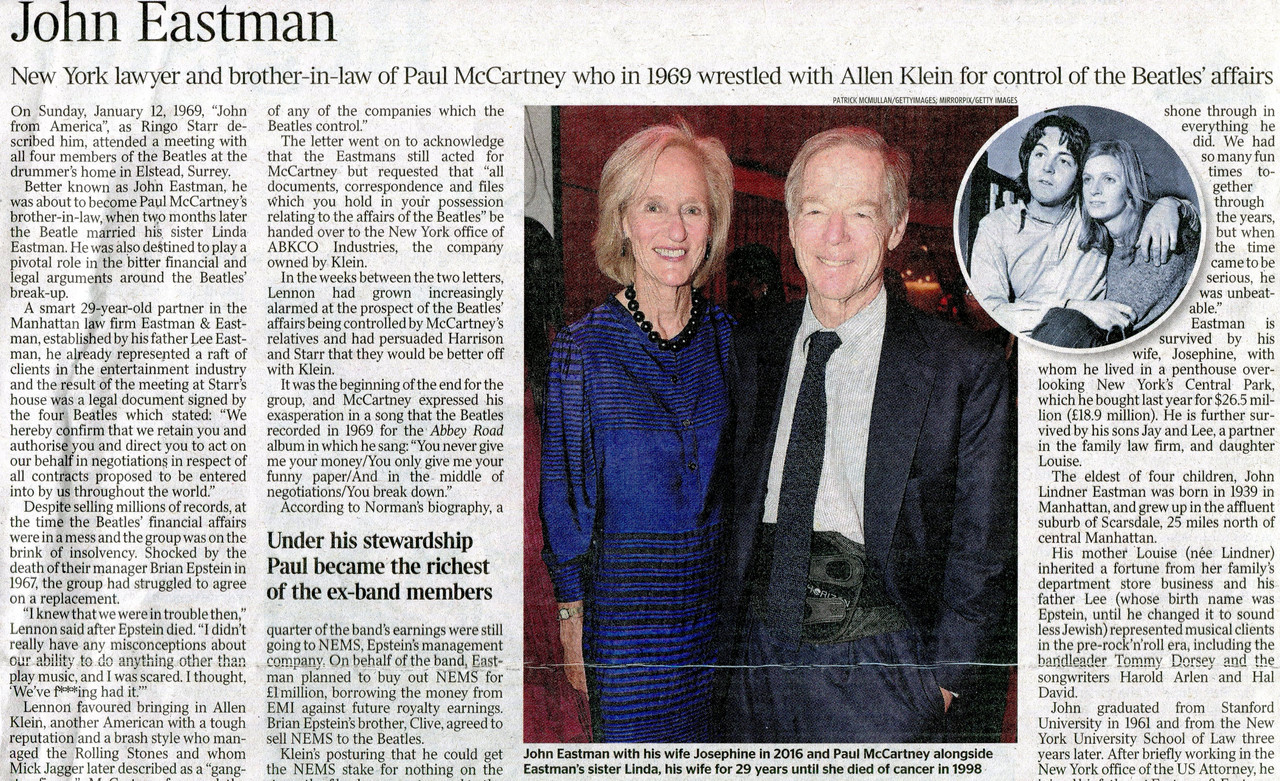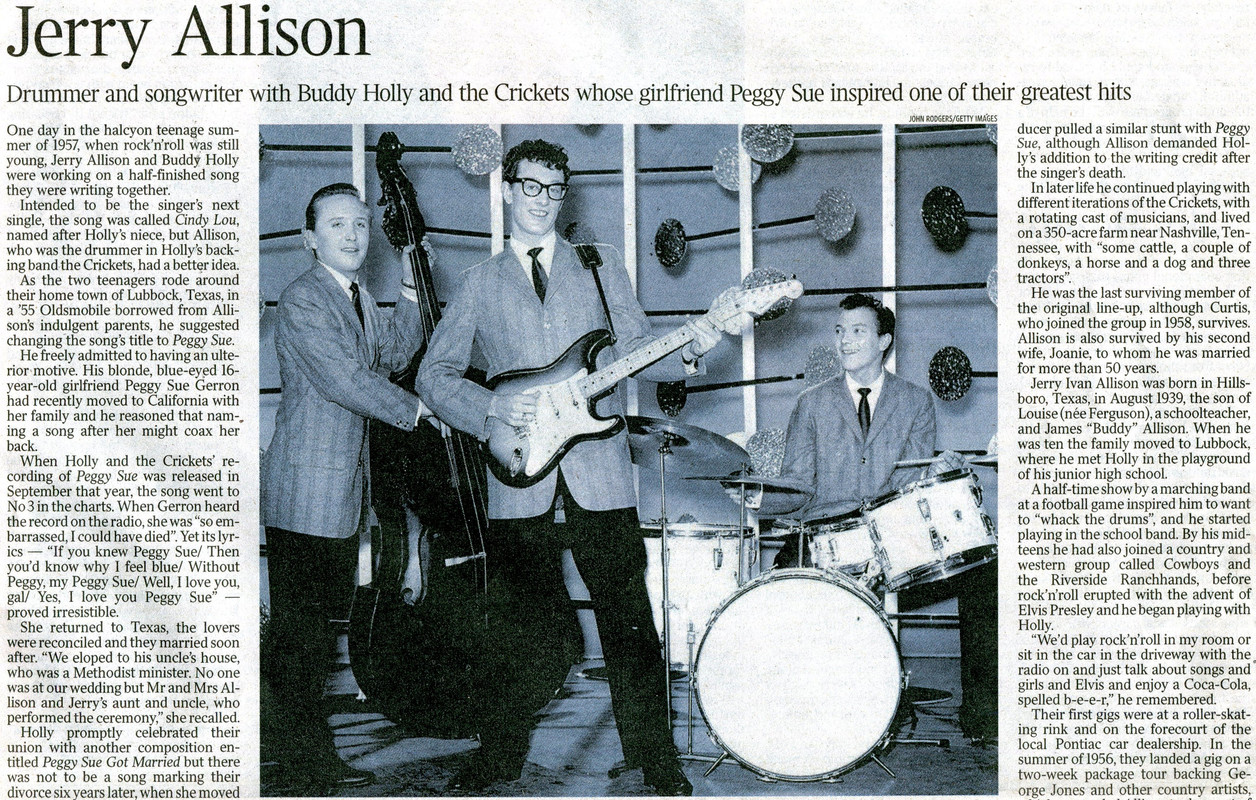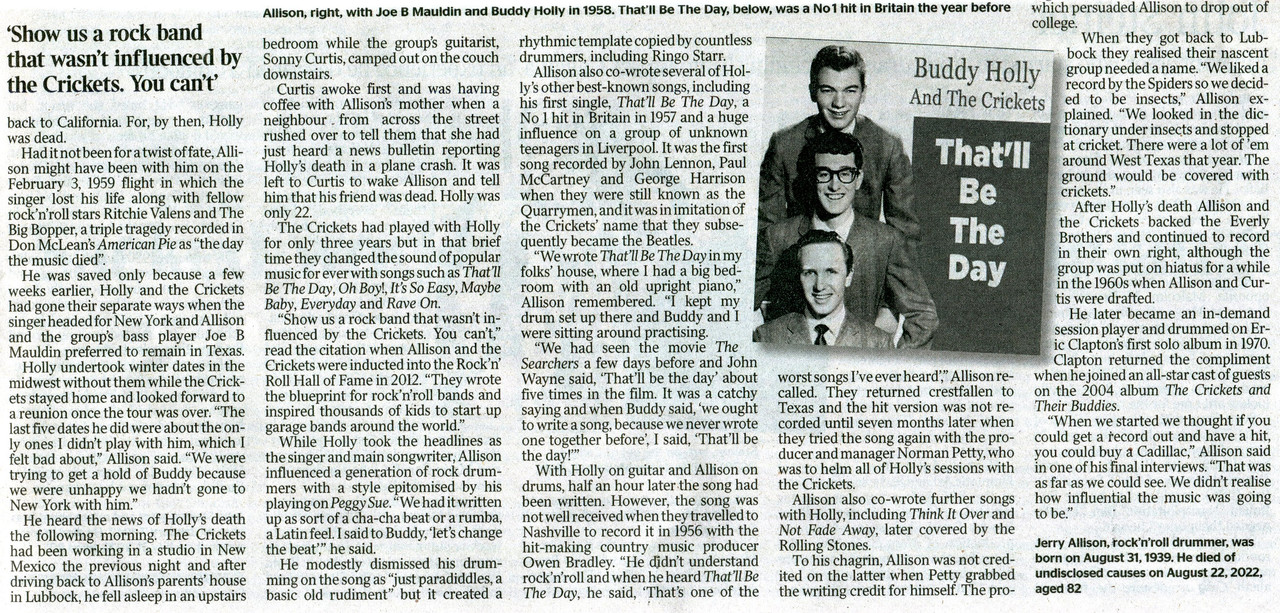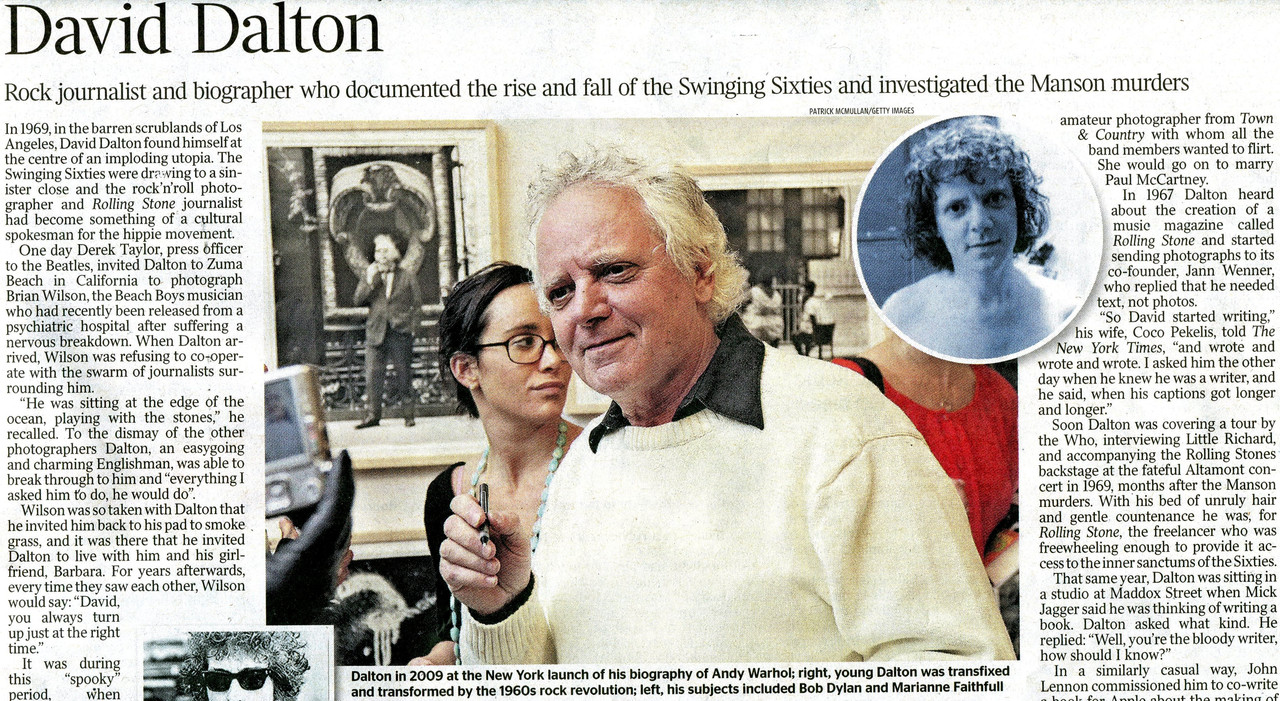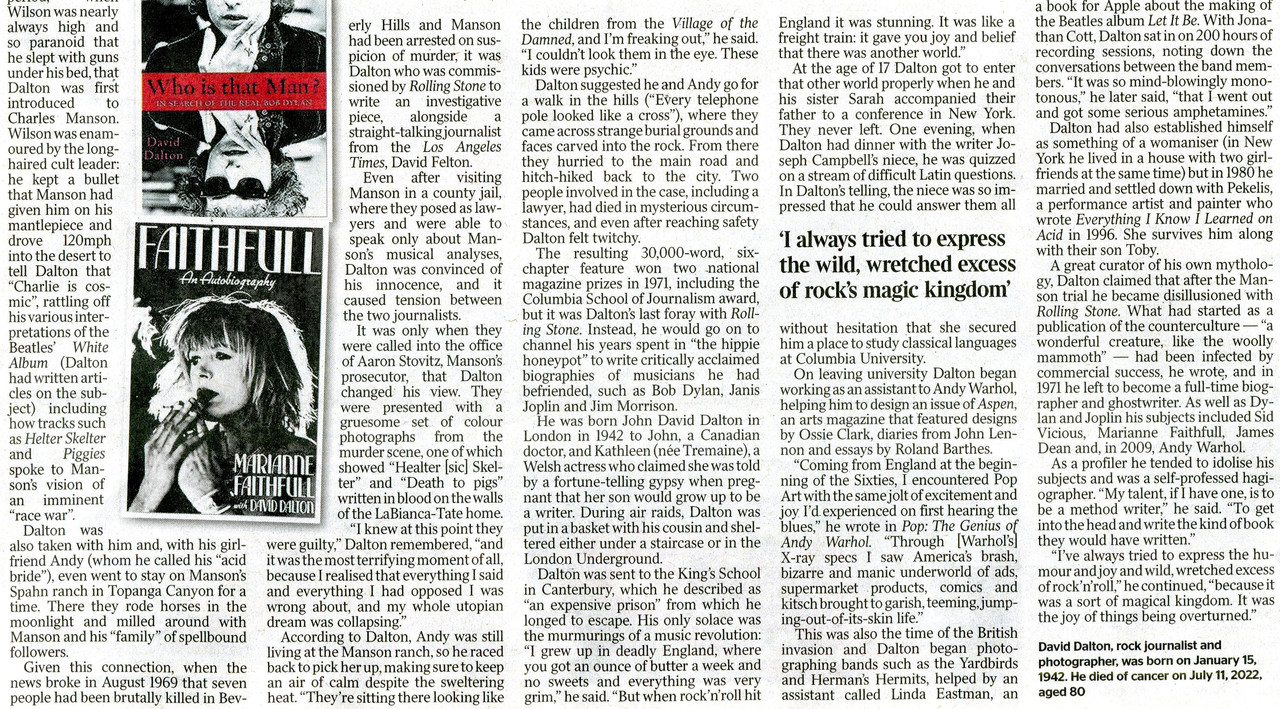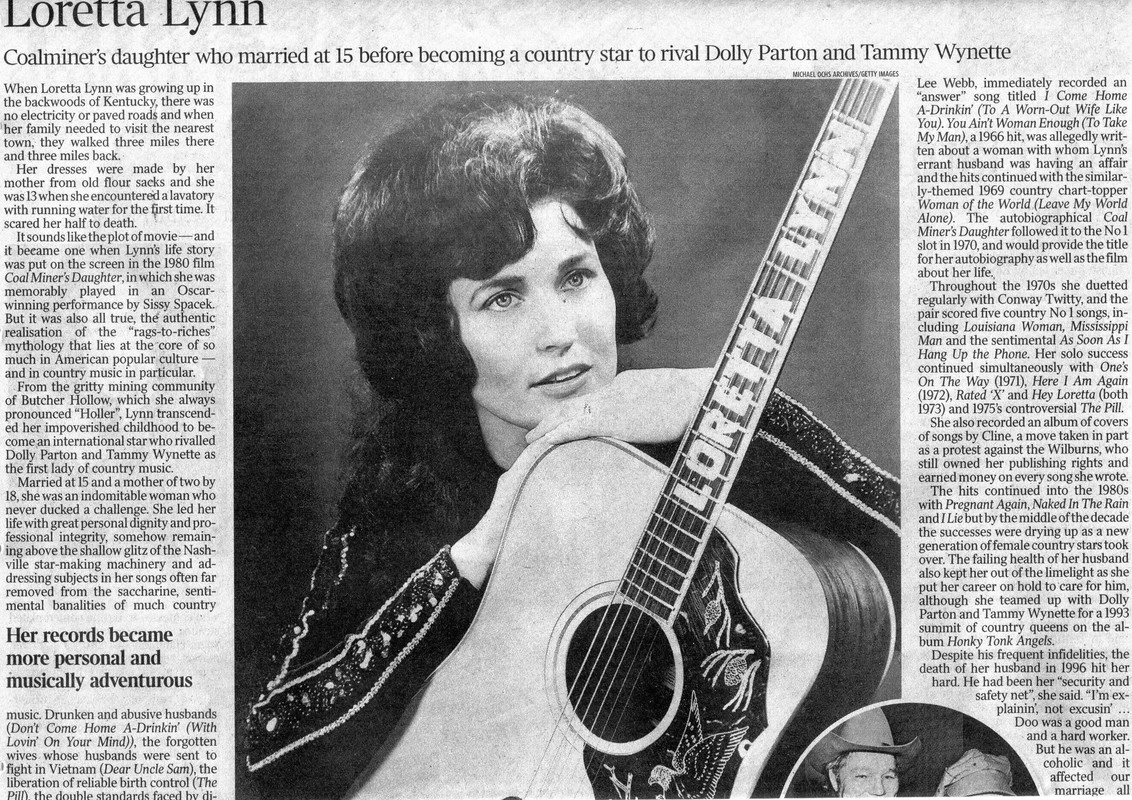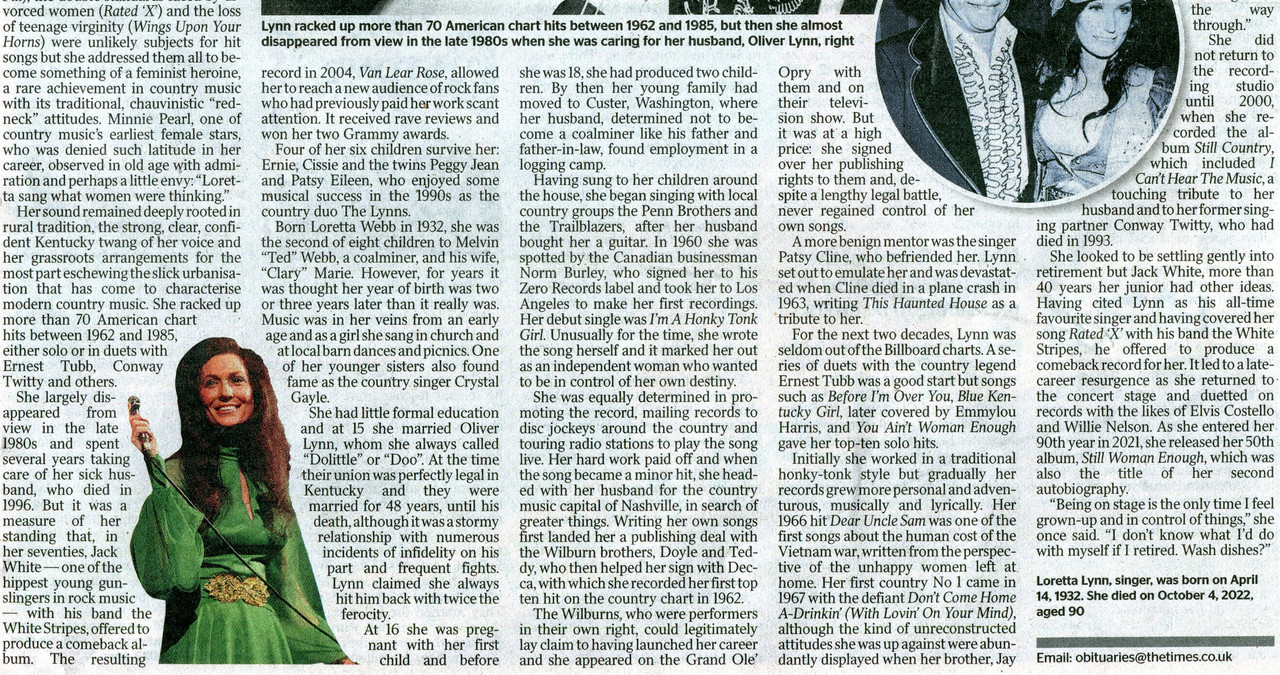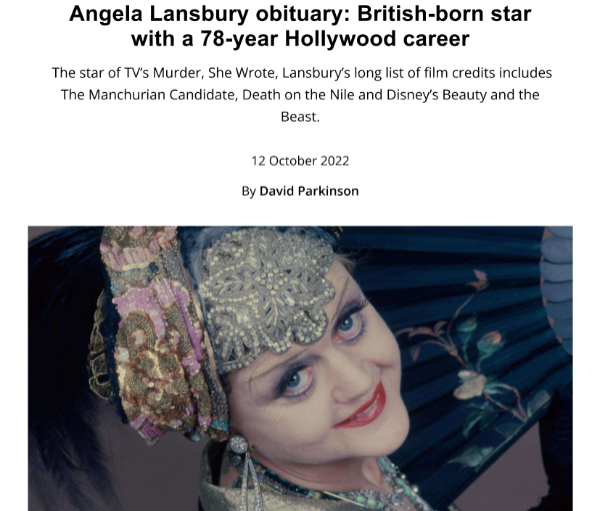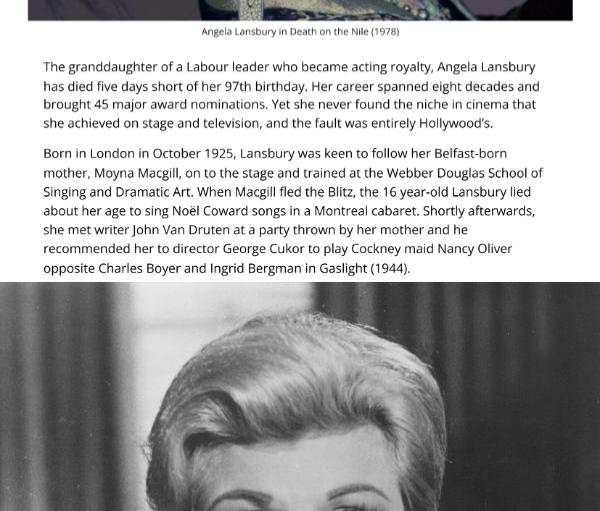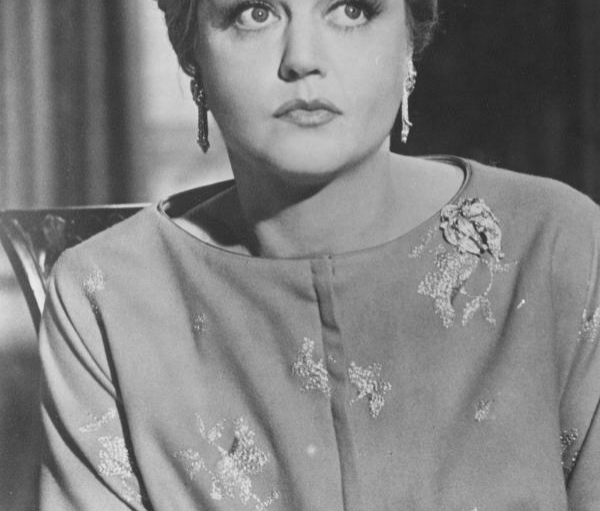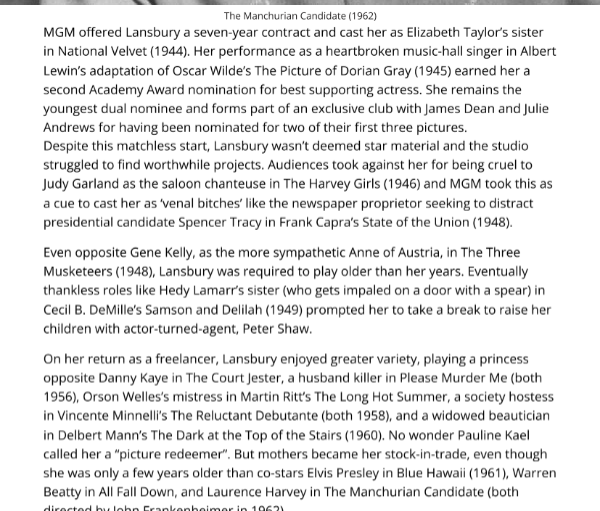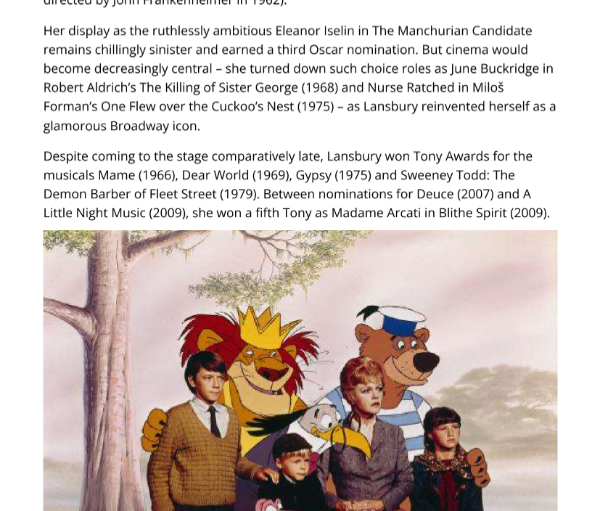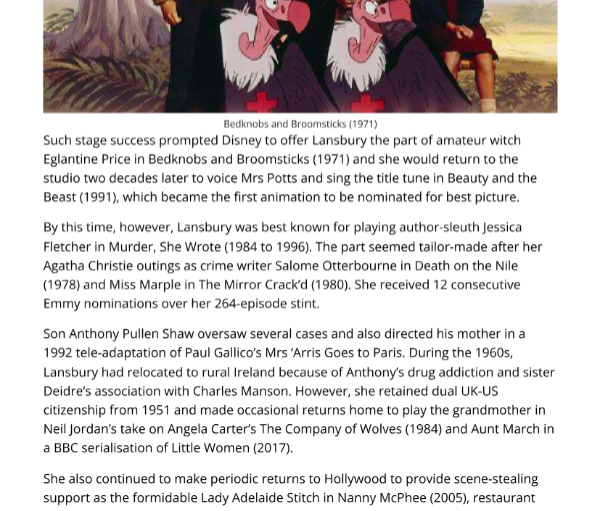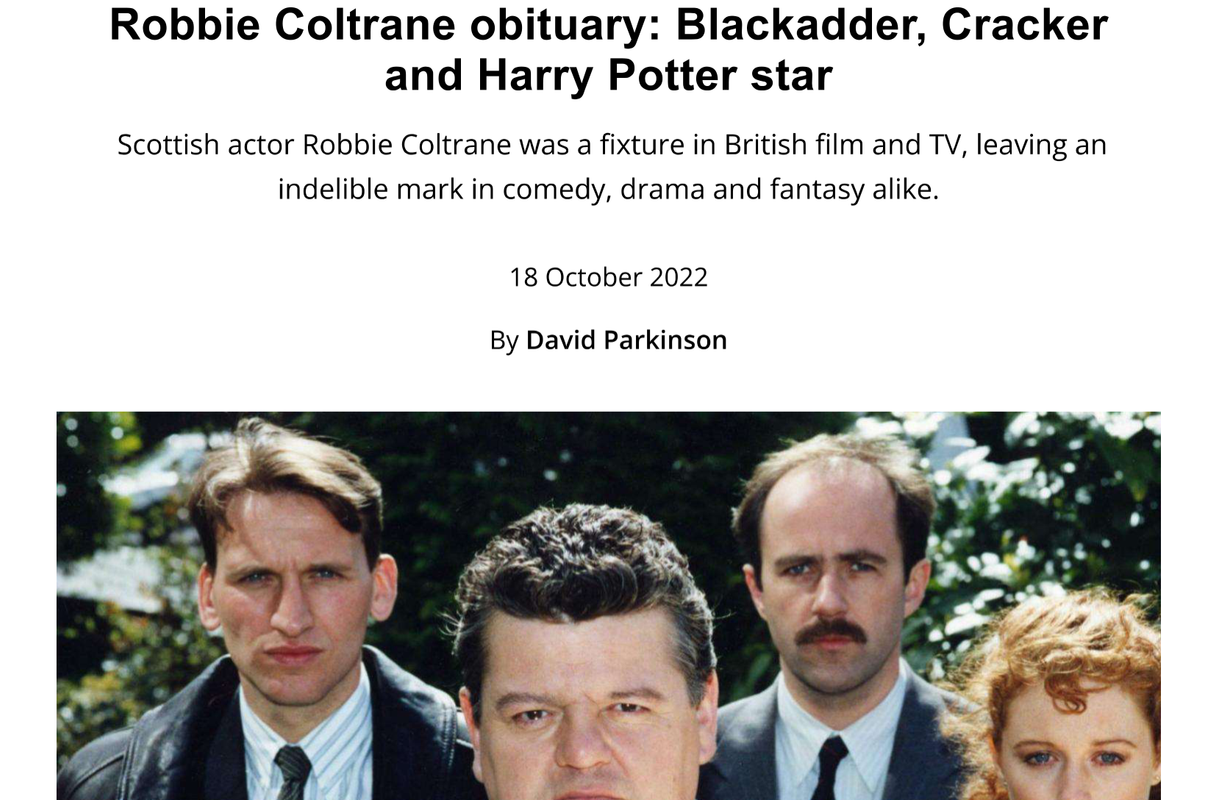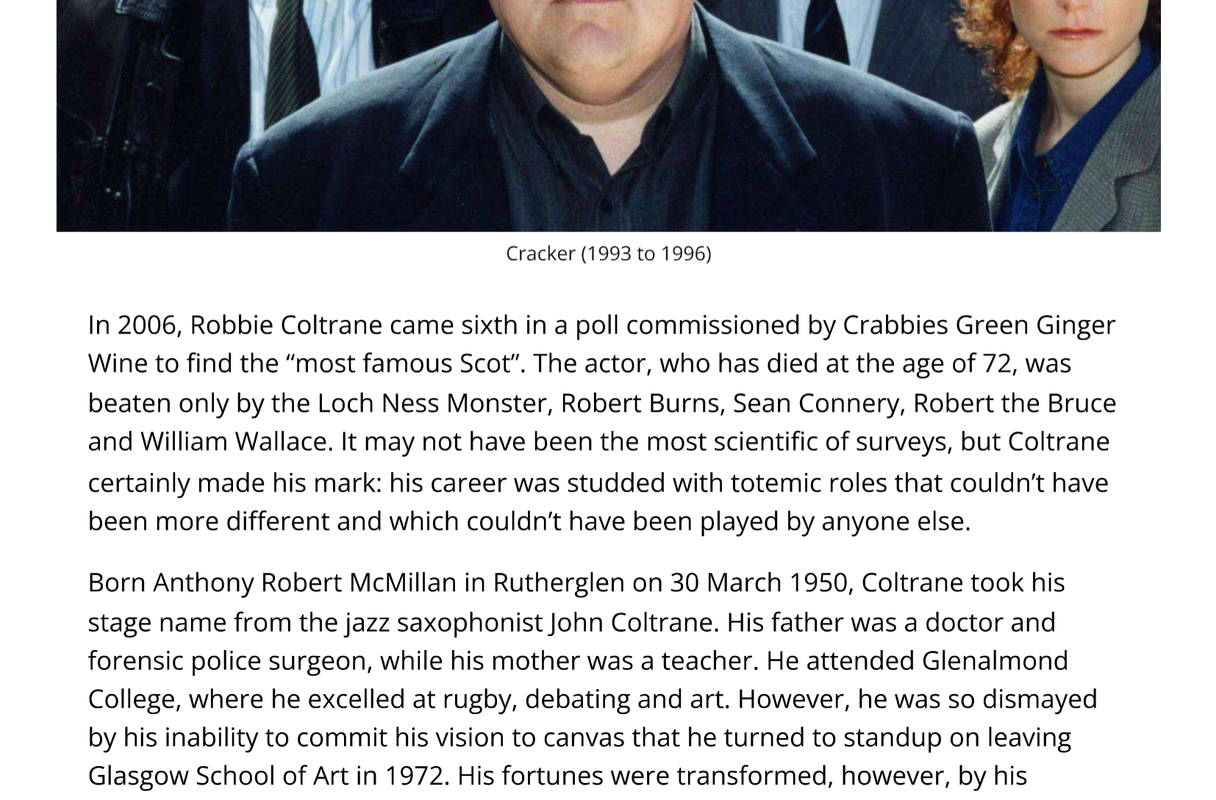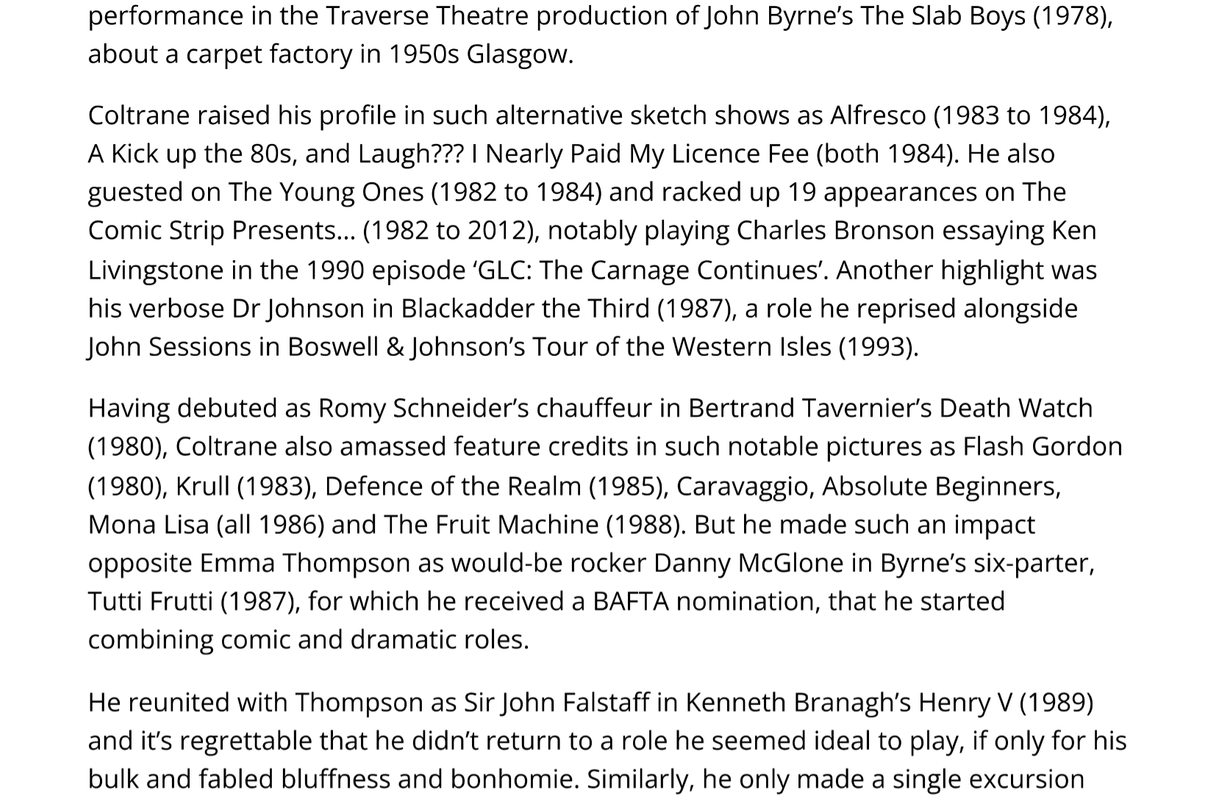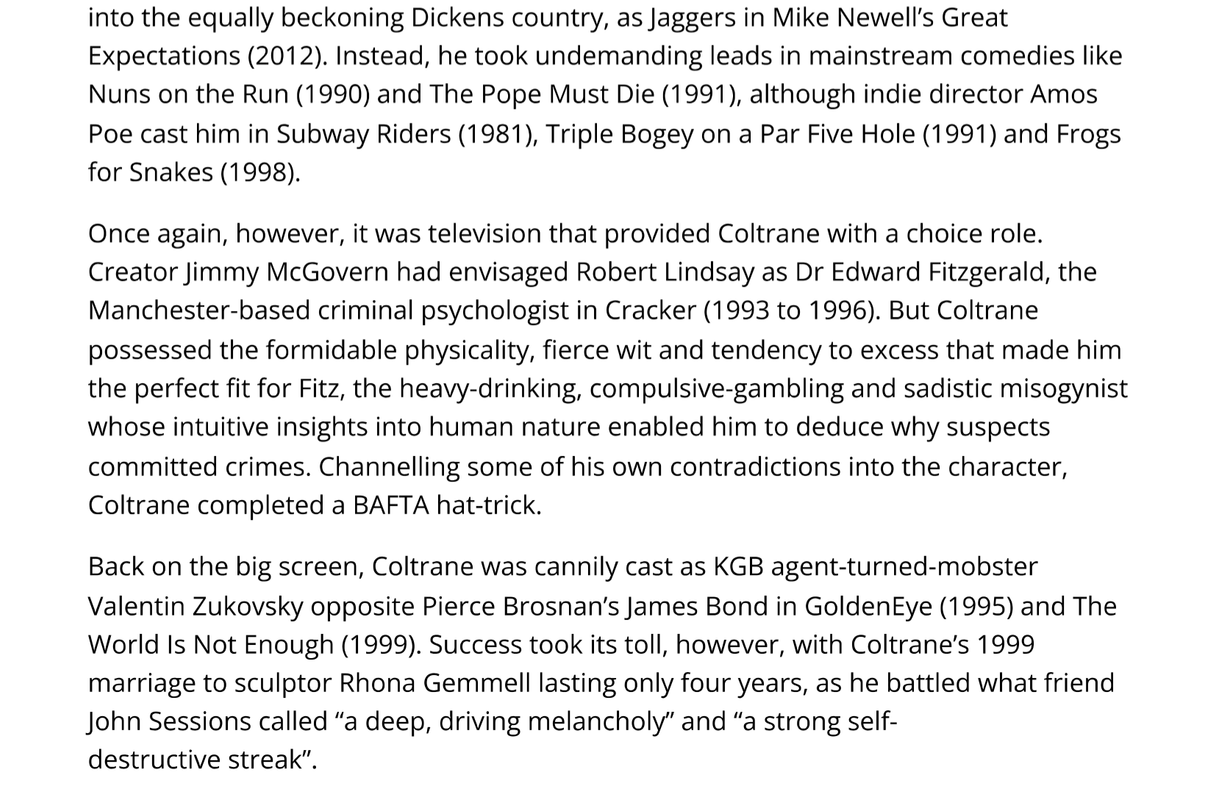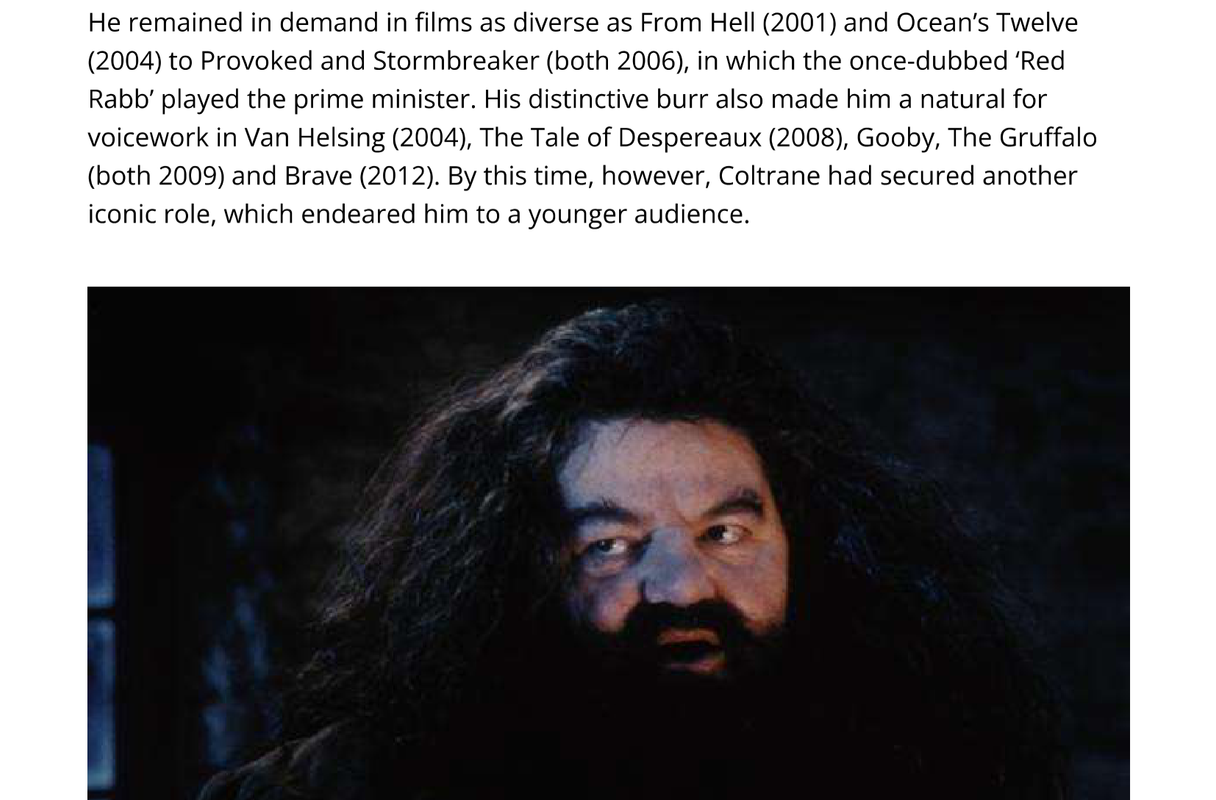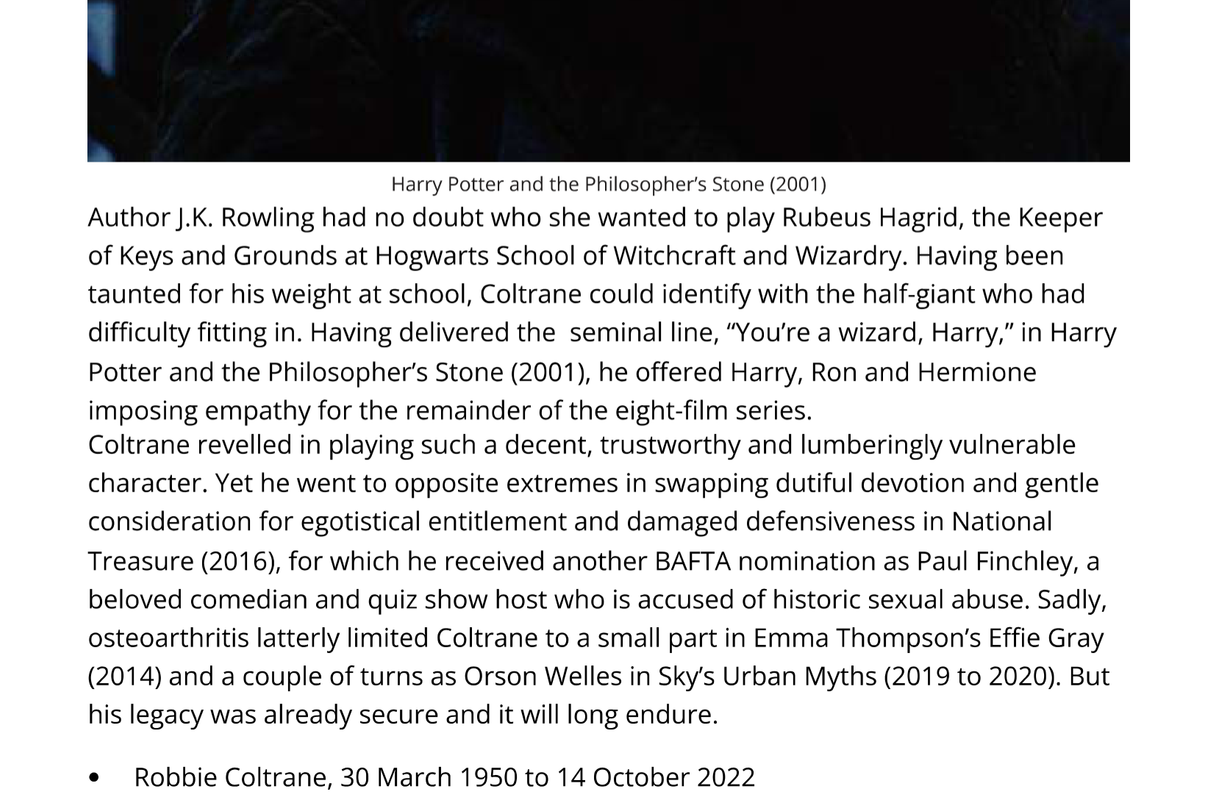Obituaries of the famous & not so famous
-
Gardner 180
- Posts: 439
- Joined: Sun Dec 02, 2018 6:17 pm
I am deeply saddened to hear that Judith Durham has passed away. Throughout the 1960s I bought all
of the singles and LPs of the Seekers. Judith had the most beautiful and strong singing voice, and in my
opinion, the finest female singing voice that I had ever heard. So sad....Rest in peace Judith.
Ray Smyth.
of the singles and LPs of the Seekers. Judith had the most beautiful and strong singing voice, and in my
opinion, the finest female singing voice that I had ever heard. So sad....Rest in peace Judith.
Ray Smyth.
-
Elaine Goulding
- Posts: 871
- Joined: Tue Mar 03, 2009 11:51 pm
- Location: Canada
So sad to hear the lovely Olivia Newton-John has passed away. What a sweetheart, she has been battling breast cancer for years.
RIP Olivia.
RIP Olivia.
Elaine
Bianca Street, Bootle - moved to Canada 1982
Bianca Street, Bootle - moved to Canada 1982
-
Gardner 180
- Posts: 439
- Joined: Sun Dec 02, 2018 6:17 pm
So sad to see in my daily paper that Olivia Newton-John has passed away.
I understand that she had been unwell for many years. Olivia was born in
Cambridge, U.K., her mother was from Berlin, and her father was from Cardiff.
The family moved to Australia when Olivia was 6 years old. Rest in peace Olivia.
Ray.
I understand that she had been unwell for many years. Olivia was born in
Cambridge, U.K., her mother was from Berlin, and her father was from Cardiff.
The family moved to Australia when Olivia was 6 years old. Rest in peace Olivia.
Ray.
-
Gardner 180
- Posts: 439
- Joined: Sun Dec 02, 2018 6:17 pm
I was saddened to hear earlier today that BBC News presenter Bill Turnbull has passed away.
Ray Smyth.
Ray Smyth.
- Dan
- Posts: 4730
- Joined: Sat Jul 07, 2018 6:24 pm
A legendary name in Bootle and Merseyside cricket.
Ian Cockbain 1958-2022.
From Wisden
by Scott Oliver
@reverse_sweeper
September 12, 2019
The Wisden Club Cricket Hall of Fame: Ian Cockbain
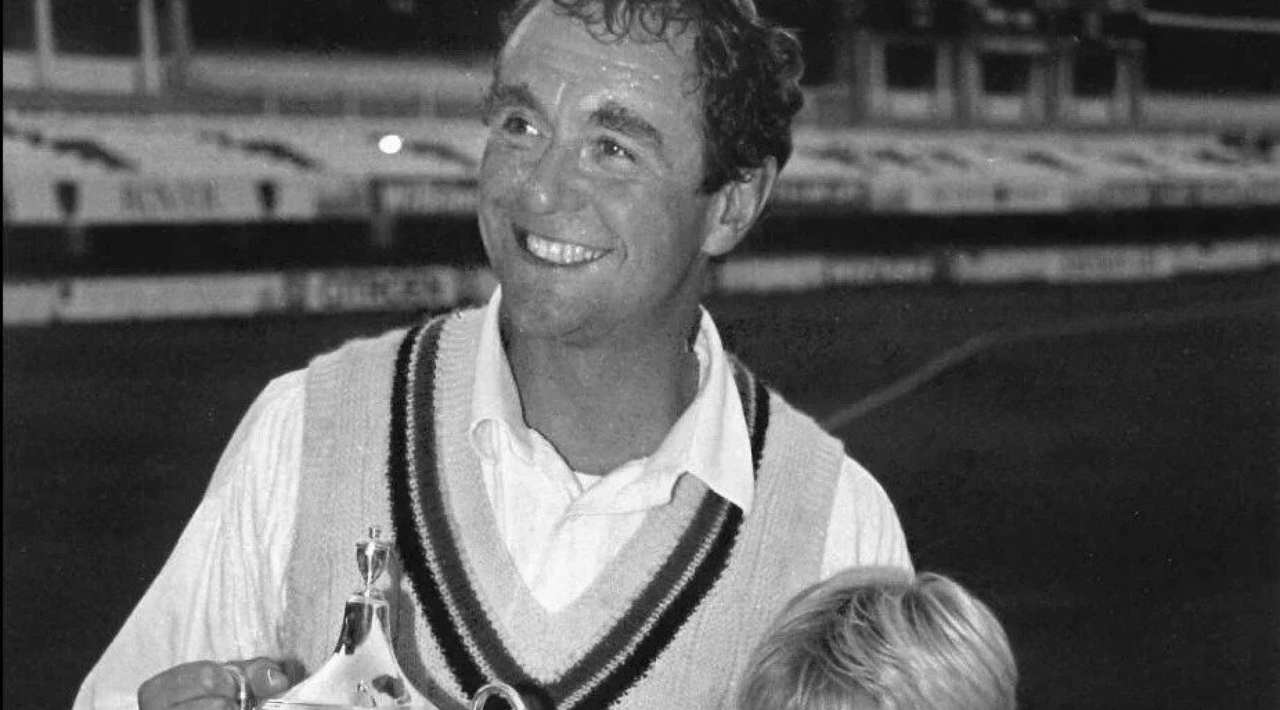
Scott Oliver profiles Ian Cockbain, a Merseyside legend who had a taste for Test attacks.
When you’ve won 39 trophies in a 22-season stint as club captain – including 10 league titles, 14 league knockouts (11 of those in 13 years) and five county cups – it seems reasonable you would be the VIP asked to open its new indoor cricket school. Such was the honour Bootle CC bestowed on the 50-year-old Ian Cockbain in 2008, his final season for the club; not that he romanticises the place he found when debuting 36 years earlier. “It was horrendous. There was never any hot water in the showers, your feet used to stick to the carpet in the bar and the toilets didn’t always work. The outfield was uneven, the wicket was awful, and the practice facilities were hopeless.”
Still, ‘Coey’ stuck around long enough to amass 29,979 runs for the club – 18,772 in the Liverpool and District Cricket Competition (LDCC) top flight, to which he added 839 for Formby when un-retiring for three years, aged 56 – while his slow left-arm chipped in 846 wickets, all this after a five-year spell on the Lancashire CCC staff, playing 47 games for the county.
Ian Cockbain 1958-2022.
From Wisden
by Scott Oliver
@reverse_sweeper
September 12, 2019
The Wisden Club Cricket Hall of Fame: Ian Cockbain

Scott Oliver profiles Ian Cockbain, a Merseyside legend who had a taste for Test attacks.
When you’ve won 39 trophies in a 22-season stint as club captain – including 10 league titles, 14 league knockouts (11 of those in 13 years) and five county cups – it seems reasonable you would be the VIP asked to open its new indoor cricket school. Such was the honour Bootle CC bestowed on the 50-year-old Ian Cockbain in 2008, his final season for the club; not that he romanticises the place he found when debuting 36 years earlier. “It was horrendous. There was never any hot water in the showers, your feet used to stick to the carpet in the bar and the toilets didn’t always work. The outfield was uneven, the wicket was awful, and the practice facilities were hopeless.”
Still, ‘Coey’ stuck around long enough to amass 29,979 runs for the club – 18,772 in the Liverpool and District Cricket Competition (LDCC) top flight, to which he added 839 for Formby when un-retiring for three years, aged 56 – while his slow left-arm chipped in 846 wickets, all this after a five-year spell on the Lancashire CCC staff, playing 47 games for the county.
-
Paul McCabe
- Posts: 294
- Joined: Thu Aug 14, 2008 12:00 pm
- Location: Bootle, Merseyside
Dan wrote: ↑Fri Sep 02, 2022 3:59 pm A legendary name in Bootle and Merseyside cricket.
Ian Cockbain 1958-2022.
From Wisden
by Scott Oliver
@reverse_sweeper
September 12, 2019
The Wisden Club Cricket Hall of Fame: Ian Cockbain
Scott Oliver profiles Ian Cockbain, a Merseyside legend who had a taste for Test attacks.
When you’ve won 39 trophies in a 22-season stint as club captain – including 10 league titles, 14 league knockouts (11 of those in 13 years) and five county cups – it seems reasonable you would be the VIP asked to open its new indoor cricket school. Such was the honour Bootle CC bestowed on the 50-year-old Ian Cockbain in 2008, his final season for the club; not that he romanticises the place he found when debuting 36 years earlier. “It was horrendous. There was never any hot water in the showers, your feet used to stick to the carpet in the bar and the toilets didn’t always work. The outfield was uneven, the wicket was awful, and the practice facilities were hopeless.”
Still, ‘Coey’ stuck around long enough to amass 29,979 runs for the club – 18,772 in the Liverpool and District Cricket Competition (LDCC) top flight, to which he added 839 for Formby when un-retiring for three years, aged 56 – while his slow left-arm chipped in 846 wickets, all this after a five-year spell on the Lancashire CCC staff, playing 47 games for the county.
I had to privilege to know Ian & watched him many times during those halcyon days back in the 80's when Bootle CC were a real Tour de Force.
Still numb with the shock of his sudden passing, as are many others.
Here's the report (below) of his passing from Firwood Bootle Cricket Club.......(PS; The showers are fine now !).
RIP Ian Cockbain.....& "Thank you for all the good times"
= = = = = =
We are so devastated and saddened to share the upsetting news today about our lifelong member Ian Cockbain Snr aka Coey
Our hearts and thoughts are with his mum Eve, his wife Lucy, Children: Ian, Charley, Jackson, Eleanor and grandson Leo and also Ian and Charley’s mum Gail and Uncle Dougie and Sisters Di and Ange and brother Mally along with all his family, friends and cricket mates as we all come to the tragic realisation of this news.
Coey was a larger than life character who was born into Bootle cricket club in April 1958 and made his debut for Bootle in 1972 age 14 vs Birkenhead Park, He became a regular member of the team in 1974 Scoring his 1st hundred against Oxton 146 not out in 1976. He then played for Lancashire in 47 first class matches scoring 1473 runs his highest score being 98 against Warickshire at S & B, during this time he only played a few matches a season for Bootle. In 1984 Ian left Lancashire and returned to play for Bootle as captain in 1986. He scored 18,364 runs at an average of 38.49 for Bootle including 1000 runs in a season 4 times, scored 19 hundreds in the Liverpool & District Competition alone and more in the knockouts. As a bowler Coey took 600 wickets at aver of 15.58
During Coey’s time as Captain Bootle won the Liverpool Competition 10 times, Lancashire Knockout 5 times, Competition Knockout 14 times, Premier League Knockout 3 times and the Liverpool Echo Knockout T20 8 times and played alongside his eldest Son Ian aka Mini on numberous matches before playing his last competitive game for Bootle in 2008 age 50 and moved to play for Formby to play alongside his youngest son Jackson.
Many of us also remember Coey captian cheshire in the Minor Counties 1994 - 2001 aswell as Captain the Minor Counties Rep Side 1993-1997. Very many happy times have been had with Ian throughout his life within our cricket community both on and off the pitch and he will forever hold and remain in a special place in all our hearts.
Rest in Peace Coey
Arrangement details will be updated in due course.
- Dan
- Posts: 4730
- Joined: Sat Jul 07, 2018 6:24 pm
New York Times September 3 2022
Earnie Shavers, heavyweight boxer.
Earnie Shavers, Hard-Punching Heavyweight, Is Dead at 78
He won 68 bouts by knockout and fought some of the biggest names in boxing.
He lasted 15 rounds against Muhammad Ali. But he never won a championship.
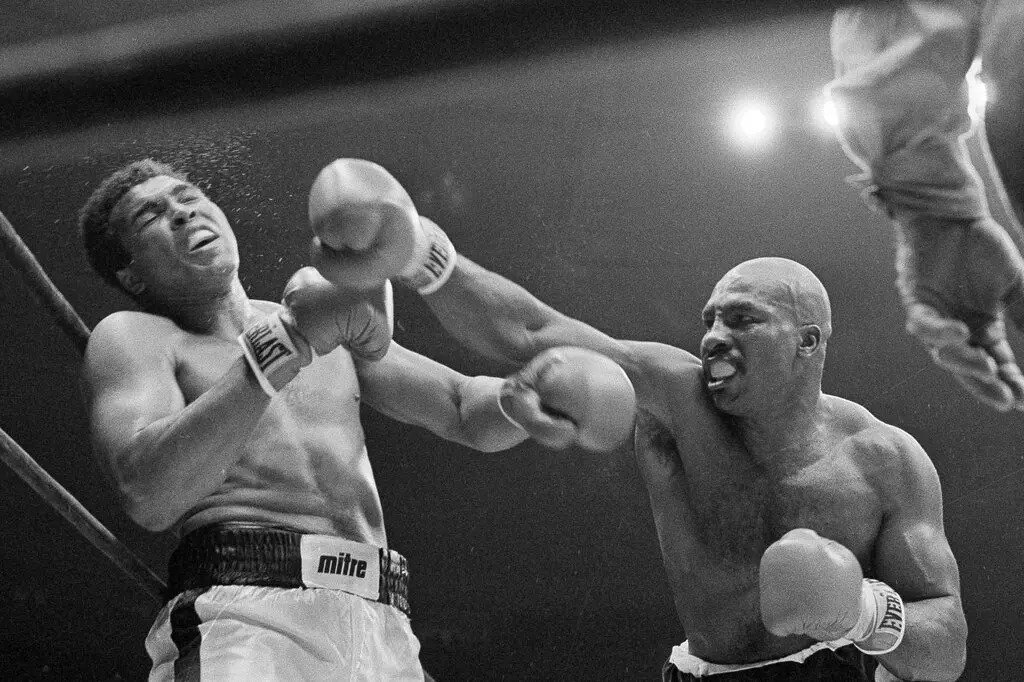
Earnie Shavers shook Muhammad Ali several times with right-hand punches, his chief weapon, in their 15-round bout at Madison Square Garden in 1977. Both men were wobbling at the final bell.Credit...Ron Frehm/Associated Press
By Richard Goldstein
Sept. 3, 2022
Earnie Shavers, who was regarded as one of the hardest punchers in boxing history, but who failed in his two quests to capture a world heavyweight championship in the 1970s, died on Thursday in Virginia, a day after his 78th birthday.
The Associated Press said it had been informed of Shavers’s death, at the home of one of his daughters, by his close friend Kenny Rainford, a British former boxer. Rainford, whose aunt was married to Shavers for a decade, did not cite the cause but said that Shavers had “slowed down all of a sudden.”
Shavers won 74 bouts, 68 by knockouts, lost 14 and fought to one draw in a professional career that lasted from 1969 to 1995.
The boxing publication The Ring recently ranked Shavers as the seventh-greatest puncher of all time.
When the heavyweight division was in its glory, Shavers traded punches with the great names of his time. He lost on a unanimous decision in his September 1977 bid to capture Muhammad Ali’s World Boxing Association and World Boxing Council crowns. He was stopped on a technical knockout in the 11th round of his September 1979 bout with Larry Holmes, the W.B.C. titleholder.
Shavers, who weighed in at 211¼ pounds to Ali’s 225, was such an underdog that there was no betting line for their fight. His shaved head, uncommon at the time, was said to be intimidating, but Ali, unimpressed, nicknamed him “the Acorn.” In a 2016 interview on the cable television show “In This Corner,” Shavers laughingly recalled Ali’s attempt to rile him.
“He was a con man,” he said of Ali. “One of the best.”
Neither fighter scored a knockdown, but Shavers shook Ali several times with right-hand punches, his fiercest weapon. Both men were wobbling at the final bell in their 15-round bout at Madison Square Garden in New York.
“Ali and Shavers stood there, swinging as if they were John Wayne and Randolph Scott in a cowboy brawl, but neither surrendered to the shelling,” Dave Anderson wrote that year in The New York Times.
“I’m tired, almost as tired as I was in Manila,” Ali told reporters afterward, referring to his storied 14-round knockout of Joe Frazier two years earlier.
Sports Illustrated ran a cover photo of Shavers delivering an overhand right with the headline “Ali’s Desperate Hour.”
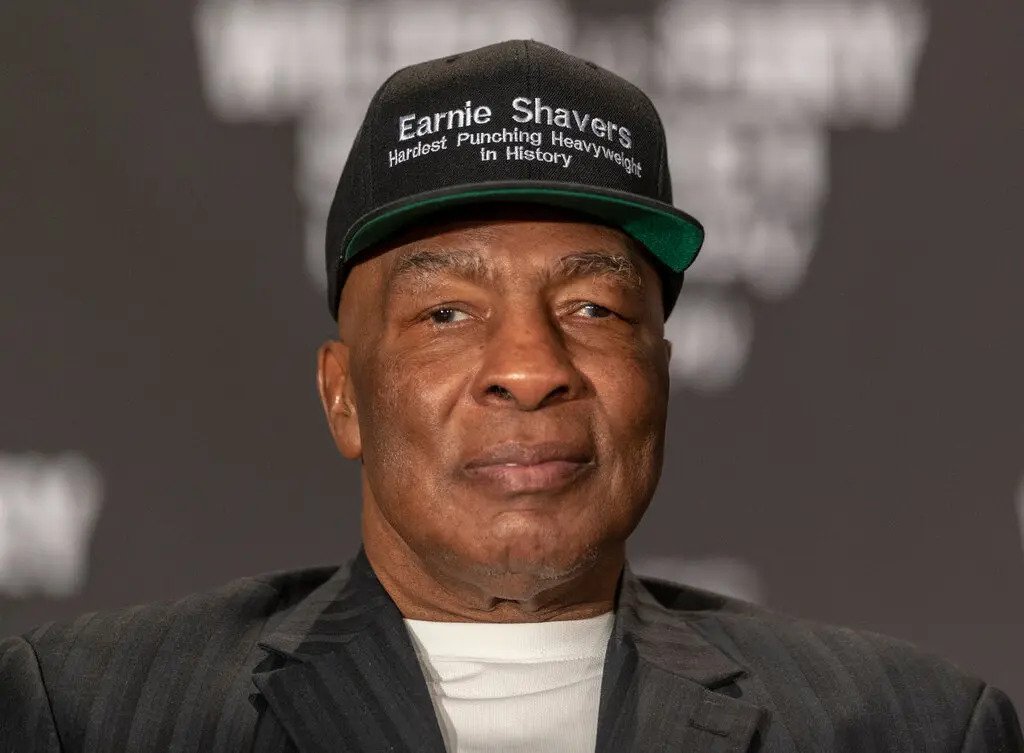
“I was a puncher from Day One,” Shavers said in 2016.
In his 1979 bid for Holmes’s titles in Las Vegas, Shavers floored Holmes in the eleventh round with a powerful right hand. Holmes got up quickly but seemed on the brink of collapse.
However, just as Shavers had been unable to finish Ali off after delivering crushing blows, he could not conquer Holmes. His wild lunges allowed Holmes to get through the final 30 seconds of the round. The referee stopped the fight in the 11th round as Holmes was pummeling an exhausted Shavers.
Earnie Dee Shavers was born on Aug. 31, 1944, in Garland, Ala., but when he was young, his family moved to the Youngstown, Ohio, area. He turned professional after some two dozen amateur fights and after capturing a national Golden Gloves heavyweight title and a national Amateur Athletic Union heavyweight title. He began to rise in the professional heavyweight ranks after hiring Don King as his promoter.
As his career progressed, Shavers defeated the former world champions Vicente Rondón, Jimmy Ellis and Ken Norton, as well as the European champion Joe Bugner.
Shavers’s bout with Holmes was his last big fight. He underwent surgery for a detached retina afterward and had not fully recovered when he was stopped in the eighth round of a bout with Tex Cobb in August 1980.
He tried to make two brief comebacks, the first in 1987 and the second in 1995. He retired for good after being knocked out by Brian Yates in the second round of their fight in November 1995.
He went on to become an ordained Christian minister, but he also made appearances in Las Vegas in his later years, signing autographs at casinos.
According to The Associated Press, Shavers had five daughters with his first wife, Laverne Payne: Tamara, Cynthia, Catherine, Carla and Amy; he also had four daughters from other relationships: Catherine, Lisa, Natasha and Latonya.
Complete information on survivors was not immediately available.
In 1992, Shavers released a video telling the story of his career. It was titled “Earnie D. Shavers, the Hardest One-Punch Hitter.”
From a Guardian article in 2001
"Heavyweight champion of the world is a phrase with its own unrivalled mystique but the accolade of being the hardest puncher who ever lived carries darker connotations. This man may not have been the best boxer to have graced a ring but he was someone to be feared.
So, if you decide on a night out some Friday or Saturday at Yates' Wine Lodge on Queens Square in the centre of Liverpool, perhaps you should consider that this is somewhere it would pay to behave. Don't even think about arguing the toss with the smiling, broad-shouldered American who greets you on the door because this is Earnie Shavers, reputed to have been the hardest-hitting heavyweight of them all."
Earnie Shavers, heavyweight boxer.
Earnie Shavers, Hard-Punching Heavyweight, Is Dead at 78
He won 68 bouts by knockout and fought some of the biggest names in boxing.
He lasted 15 rounds against Muhammad Ali. But he never won a championship.

Earnie Shavers shook Muhammad Ali several times with right-hand punches, his chief weapon, in their 15-round bout at Madison Square Garden in 1977. Both men were wobbling at the final bell.Credit...Ron Frehm/Associated Press
By Richard Goldstein
Sept. 3, 2022
Earnie Shavers, who was regarded as one of the hardest punchers in boxing history, but who failed in his two quests to capture a world heavyweight championship in the 1970s, died on Thursday in Virginia, a day after his 78th birthday.
The Associated Press said it had been informed of Shavers’s death, at the home of one of his daughters, by his close friend Kenny Rainford, a British former boxer. Rainford, whose aunt was married to Shavers for a decade, did not cite the cause but said that Shavers had “slowed down all of a sudden.”
Shavers won 74 bouts, 68 by knockouts, lost 14 and fought to one draw in a professional career that lasted from 1969 to 1995.
The boxing publication The Ring recently ranked Shavers as the seventh-greatest puncher of all time.
When the heavyweight division was in its glory, Shavers traded punches with the great names of his time. He lost on a unanimous decision in his September 1977 bid to capture Muhammad Ali’s World Boxing Association and World Boxing Council crowns. He was stopped on a technical knockout in the 11th round of his September 1979 bout with Larry Holmes, the W.B.C. titleholder.
Shavers, who weighed in at 211¼ pounds to Ali’s 225, was such an underdog that there was no betting line for their fight. His shaved head, uncommon at the time, was said to be intimidating, but Ali, unimpressed, nicknamed him “the Acorn.” In a 2016 interview on the cable television show “In This Corner,” Shavers laughingly recalled Ali’s attempt to rile him.
“He was a con man,” he said of Ali. “One of the best.”
Neither fighter scored a knockdown, but Shavers shook Ali several times with right-hand punches, his fiercest weapon. Both men were wobbling at the final bell in their 15-round bout at Madison Square Garden in New York.
“Ali and Shavers stood there, swinging as if they were John Wayne and Randolph Scott in a cowboy brawl, but neither surrendered to the shelling,” Dave Anderson wrote that year in The New York Times.
“I’m tired, almost as tired as I was in Manila,” Ali told reporters afterward, referring to his storied 14-round knockout of Joe Frazier two years earlier.
Sports Illustrated ran a cover photo of Shavers delivering an overhand right with the headline “Ali’s Desperate Hour.”

“I was a puncher from Day One,” Shavers said in 2016.
In his 1979 bid for Holmes’s titles in Las Vegas, Shavers floored Holmes in the eleventh round with a powerful right hand. Holmes got up quickly but seemed on the brink of collapse.
However, just as Shavers had been unable to finish Ali off after delivering crushing blows, he could not conquer Holmes. His wild lunges allowed Holmes to get through the final 30 seconds of the round. The referee stopped the fight in the 11th round as Holmes was pummeling an exhausted Shavers.
Earnie Dee Shavers was born on Aug. 31, 1944, in Garland, Ala., but when he was young, his family moved to the Youngstown, Ohio, area. He turned professional after some two dozen amateur fights and after capturing a national Golden Gloves heavyweight title and a national Amateur Athletic Union heavyweight title. He began to rise in the professional heavyweight ranks after hiring Don King as his promoter.
As his career progressed, Shavers defeated the former world champions Vicente Rondón, Jimmy Ellis and Ken Norton, as well as the European champion Joe Bugner.
Shavers’s bout with Holmes was his last big fight. He underwent surgery for a detached retina afterward and had not fully recovered when he was stopped in the eighth round of a bout with Tex Cobb in August 1980.
He tried to make two brief comebacks, the first in 1987 and the second in 1995. He retired for good after being knocked out by Brian Yates in the second round of their fight in November 1995.
He went on to become an ordained Christian minister, but he also made appearances in Las Vegas in his later years, signing autographs at casinos.
According to The Associated Press, Shavers had five daughters with his first wife, Laverne Payne: Tamara, Cynthia, Catherine, Carla and Amy; he also had four daughters from other relationships: Catherine, Lisa, Natasha and Latonya.
Complete information on survivors was not immediately available.
In 1992, Shavers released a video telling the story of his career. It was titled “Earnie D. Shavers, the Hardest One-Punch Hitter.”
From a Guardian article in 2001
"Heavyweight champion of the world is a phrase with its own unrivalled mystique but the accolade of being the hardest puncher who ever lived carries darker connotations. This man may not have been the best boxer to have graced a ring but he was someone to be feared.
So, if you decide on a night out some Friday or Saturday at Yates' Wine Lodge on Queens Square in the centre of Liverpool, perhaps you should consider that this is somewhere it would pay to behave. Don't even think about arguing the toss with the smiling, broad-shouldered American who greets you on the door because this is Earnie Shavers, reputed to have been the hardest-hitting heavyweight of them all."
-
Gardner 180
- Posts: 439
- Joined: Sun Dec 02, 2018 6:17 pm
Actress Angela Lansbury has passed away aged 96. Rest in peace.
Ray
Ray
- Dan
- Posts: 4730
- Joined: Sat Jul 07, 2018 6:24 pm
From the NME.
Jerry Lee Lewis, 1935-2022: an original rock’n’roller and the last of the gang to die
The ‘50s star was a massive influence for artists like Elton John and John Lennon, but is overshadowed by a toxic legacy
By Jordan Bassett 29th October 2022
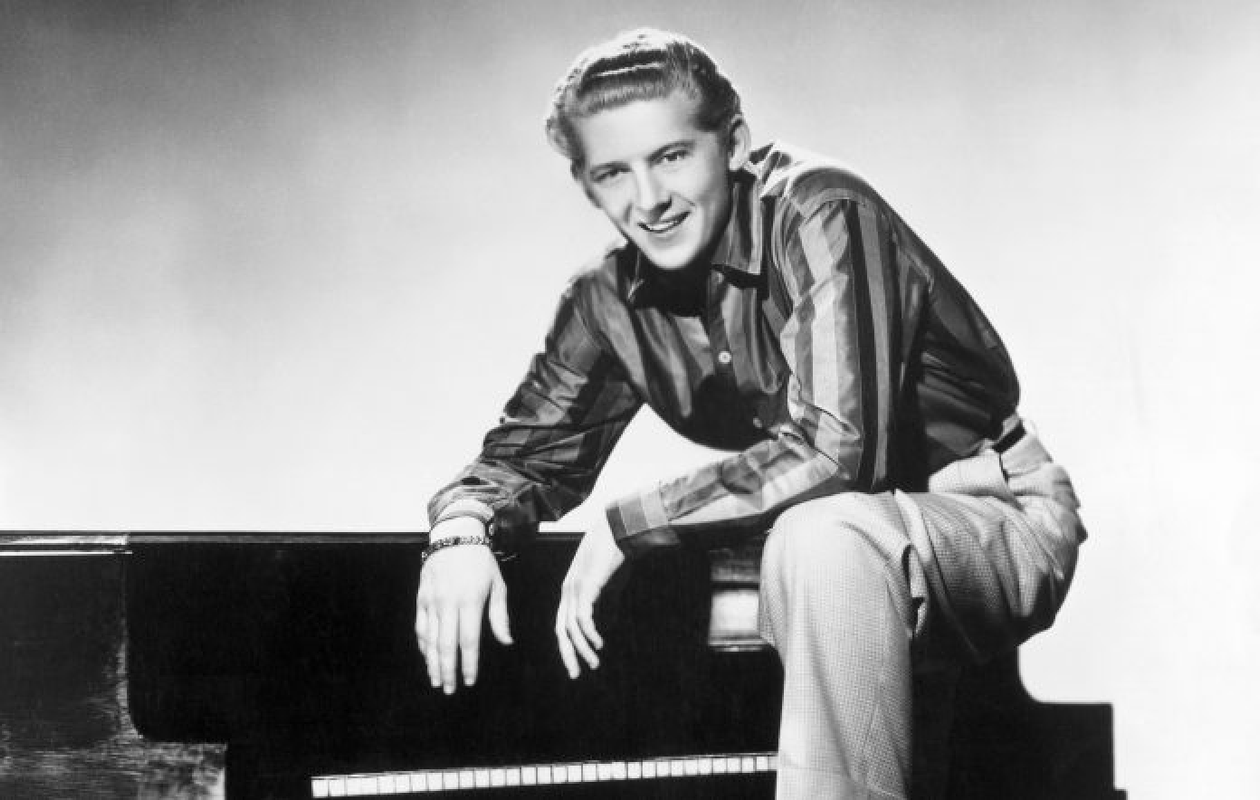
1957, Tennessee, Memphis, Jerry Lee Lewis. (Photo by Michael Ochs Archives/Getty Images)
Of course he put up a fight. Reports of Jerry Lee Lewis’ death have greatly exaggerated in recent days: “TMZ reported erroneously off of a bullshit anonymous tip,” his spokesperson announced on Thursday (October 27). But now here it is: the final man standing from the first generation of rock’n’rollers really is dead at the age of 87. The last of the gang to die was the most contemptible and notorious of his contemporaries. Elvis Presley was The King of Rock’n’roll, Little Richard its King and Queen. And Jerry Lee? He called himself the Killer.
The nickname was allegedly earned at school after he’d tried to strangle a teacher with his own tie. And he spent a career living up to that fearsome reputation, his fiery boogie-woogie poured into a flamboyant, piano-pounding style laced with the evangelical fervour drummed into him by his devout Christian mother, Mary Herron Lewis. It was a style that made monster hits of his mid-‘50s tunes ‘Whole Lotta Shakin’ Goin’ On’ and ‘Great Balls Of Fire’, which were released by Sun Records, the label that launched Elvis Presley. The flipside of his personality was a string of lamentable controversies that vastly overshadow his legacy.
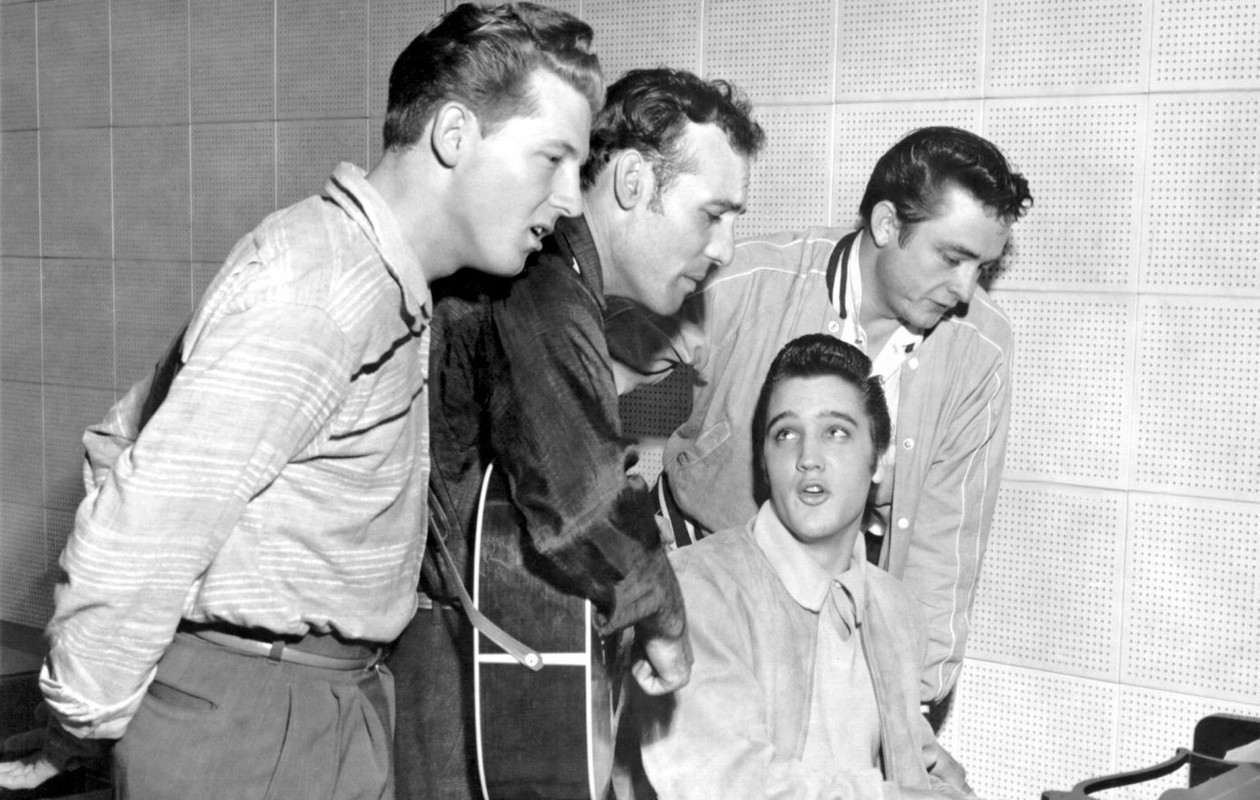
MEMPHIS, TN – DECEMBER 04: Rock and roll musicians Jerry Lee Lewis, Carl Perkins, Elvis Presley and Johnny Cash as “The Million Dollar Quartet” December 4, 1956 in Memphis, Tennessee. This was a one night jam session at Sun Studios. (Photo by Michael Ochs Archives/Getty Images)
Jerry Lee Lewis was born in Ferriday, Louisiana, in 1935. His father, Elmo Lewis, was a farmer and bootlegger who infamously mortgaged the family home for $250 to buy his son a piano. The boy’s talent had become obvious when he was kicked out of school for playing a sacrilegiously raunchy version of the gospel song ‘God Is Real’. No matter: he and Elmo travelled state in an old wagon, with Jerry Lee performing on the back of the vehicle, bringing his sinful sound to the people.
Inspired by honky-tonk bars he attended against Mary’s wishes, the superstar-in-waiting began to develop the uniquely frenetic and hard-boiled sound that inspired the likes of Elton John and John Lennon (the latter kissed his feet when they met in the 1970s). Certain he could beat Elvis at his own game, Jerry Lee rolled up to Sun Records in November 1956 and demanded an audition. “I’m a hit,” he told engineer Jack Clement. When Clement replied, “They all say that, son,” Jerry Lee insisted: “I’m not all. I’m different.”
The resulting ‘Crazy Arms’, the countrified ballad that kickstarted his career, proved him right – but Mary’s voice was never far from his mind. A studio off-cut from the recording of ‘Great Balls of Fire’ caught him fretting that the suggestive song is “sinful”. When Phillips assured him that his music could “save souls’, Jerry Lee wailed: “No, no, no, no! How can the Devil save souls? What are you talkin’ about? I got the Devil in me!”
If you know one thing about Jerry Lee Lewis, it will be that he married his 13-year-old cousin, Myra Gale Brown, in 1958. ‘Whole Lotta Shakin’ Goin’ On’ had reached Number One in the pop, country and western and R&B Billboard charts and sold a million copies in 10 days. He was due to embark on a 30-date UK tour, from which he would pocket the then-astronomical sum of $26,000. Instead he was cancelled – quite literally – upon arrival.
Reporters met Myra and the 22-year-old Jerry Lee at Heathrow airport and immediately asked after her age. Jerry lied, and the Daily Herald still made the story a headline splash:
ROCK STAR’S WIFE IS 15
And it’s his third marriage!
When the truth crept out, the outrage, naturally, ballooned. “He should be deported at once!” demanded London’s Evening Star, while audience members at Tooting’s Granada Theatre heckled him as a “cradle-robber!”. The tour was duly pulled and Jerry Lee scuttled back to the US. “BABY-SNATCHER QUITS,” roared the headline in the Herald.
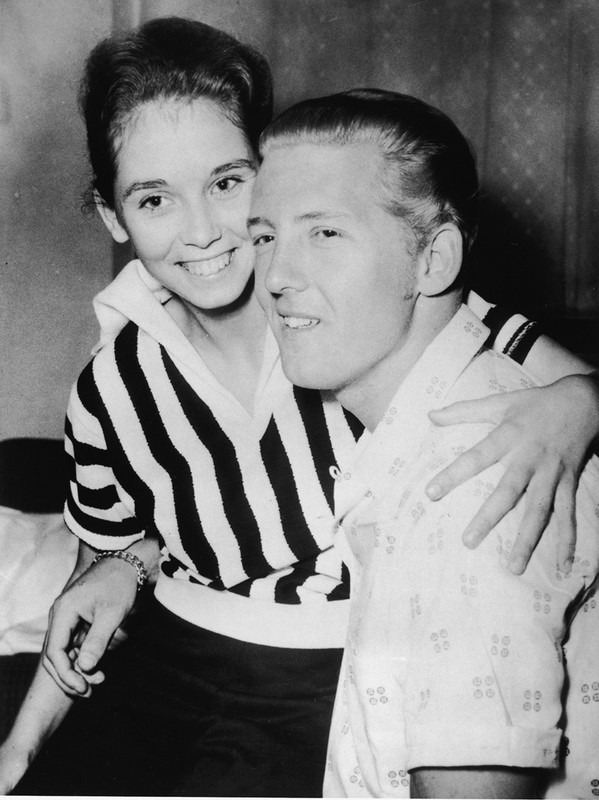
American rock musician Jerry Lee Lewis holds his second cousin and third wife Myra Brown in his lap at a press conference in the Westbury Hotel, London, May 23, 1958. (Photo by Hulton Archive/Getty Images)
If you know two things about Jerry Lee Lewis, it will be that he was also arrested, in 1976, after screeching up to the gates of Elvis’ Memphis mansion, Graceland. With a bellyful of booze and a pistol on the dashboard, he demanded to settle once and for all the question of who the real King of Rock’n’roll was. Elvis reportedly watched the action on CCTV.
The Myra Brown scandal and the Graceland arrest occurred almost two decades apart, proof that his first brush with notoriety had failed to make him the righteous man he claimed he longed to be. During the 20 years between these incidents, Jerry had very much hit the skids and bounced back.
Upon his return from the UK in 1958, the American press deemed him to have brought shame upon the country. His career collapsed overnight. The hits dried up and the gigs were just as bad: he fell from earning $10,000 a night to $250, slogging around tiny venues where he’d play for nine hours at a time. In 1962, his and Myra’s three-year-old son, Steve Allen, died in a tragic accident, sending the singer into a nightmarish spiral of drug and alcohol addiction. He spent a decade in obscurity after that cancelled UK tour.
And then something strange happened. Jerry Lee reinvented himself as a wildly successful country singer, a move instigated by Mercury Records executive Eddie Kilroy, who perhaps sensed that the pain and fury in the Killer’s heart would lend itself well to the genre. After all, his furious 1964 album ‘Live at the Star-Club Hamburg’, recorded while he was in the abyss, remains one of the greatest live records ever released. Sure enough, the anguished ‘Another Place, Another Time’ reached Number Four on the US Hot Country Songs Billboard chart. By 1969, biographer Nick Tosche noted in Hellfire: The Jerry Lewis Story, he was the “hottest country singer in the South”.
Thus began a career second wind that saw him through the ‘70s, though he always kept one foot in rock’n’roll. The 1973 album ‘Southern Roots: Back Home To Memphis’ is an undersung gem, containing a deliriously uplifting cover of the Sam & Dave soul song ‘Hold On, I’m Comin’’, on which he lasciviously purrs: “Hold on – Jerry’s comin’!” His personal life, though, remained an abomination.
Myra had filed for divorce in 1970, citing adultery and abuse. In 1983, his fifth wife, Shawn Stephens, died just 10 weeks into their marriage. A Rolling Stone article claimed that Jerry Lee’s version of events did not match up with those detailed in the police investigation; a grand jury found no evidence of wrongdoing. In 2012, he married his seventh and final wife, Judith, who, bizarrely, had previously been married to Myra’s brother. In 2015, Lewis told The Guardian: “I was always worried whether I was going to Heaven or Hell… I worry about it before I go to bed… When you breathe your last breath, where are you going to go?”
Jerry Lee Lewis released his final album, the covers collection ‘Rock & Roll Time’, in 2014. True to the pattern of his career, it actually mostly consisted of country songs. “I hang my head and cry,” he croaked on the Johnny Cash tune ‘Folsom Prison Blues’, but you’d swear it was delivered with a smirk. Who knows what will become of The Killer after his final breath. It probably doesn’t matter – he’ll shake down those Pearly Gates either way. Hold on – Jerry’s comin’.
Jerry Lee Lewis, 1935-2022: an original rock’n’roller and the last of the gang to die
The ‘50s star was a massive influence for artists like Elton John and John Lennon, but is overshadowed by a toxic legacy
By Jordan Bassett 29th October 2022

1957, Tennessee, Memphis, Jerry Lee Lewis. (Photo by Michael Ochs Archives/Getty Images)
Of course he put up a fight. Reports of Jerry Lee Lewis’ death have greatly exaggerated in recent days: “TMZ reported erroneously off of a bullshit anonymous tip,” his spokesperson announced on Thursday (October 27). But now here it is: the final man standing from the first generation of rock’n’rollers really is dead at the age of 87. The last of the gang to die was the most contemptible and notorious of his contemporaries. Elvis Presley was The King of Rock’n’roll, Little Richard its King and Queen. And Jerry Lee? He called himself the Killer.
The nickname was allegedly earned at school after he’d tried to strangle a teacher with his own tie. And he spent a career living up to that fearsome reputation, his fiery boogie-woogie poured into a flamboyant, piano-pounding style laced with the evangelical fervour drummed into him by his devout Christian mother, Mary Herron Lewis. It was a style that made monster hits of his mid-‘50s tunes ‘Whole Lotta Shakin’ Goin’ On’ and ‘Great Balls Of Fire’, which were released by Sun Records, the label that launched Elvis Presley. The flipside of his personality was a string of lamentable controversies that vastly overshadow his legacy.

MEMPHIS, TN – DECEMBER 04: Rock and roll musicians Jerry Lee Lewis, Carl Perkins, Elvis Presley and Johnny Cash as “The Million Dollar Quartet” December 4, 1956 in Memphis, Tennessee. This was a one night jam session at Sun Studios. (Photo by Michael Ochs Archives/Getty Images)
Jerry Lee Lewis was born in Ferriday, Louisiana, in 1935. His father, Elmo Lewis, was a farmer and bootlegger who infamously mortgaged the family home for $250 to buy his son a piano. The boy’s talent had become obvious when he was kicked out of school for playing a sacrilegiously raunchy version of the gospel song ‘God Is Real’. No matter: he and Elmo travelled state in an old wagon, with Jerry Lee performing on the back of the vehicle, bringing his sinful sound to the people.
Inspired by honky-tonk bars he attended against Mary’s wishes, the superstar-in-waiting began to develop the uniquely frenetic and hard-boiled sound that inspired the likes of Elton John and John Lennon (the latter kissed his feet when they met in the 1970s). Certain he could beat Elvis at his own game, Jerry Lee rolled up to Sun Records in November 1956 and demanded an audition. “I’m a hit,” he told engineer Jack Clement. When Clement replied, “They all say that, son,” Jerry Lee insisted: “I’m not all. I’m different.”
The resulting ‘Crazy Arms’, the countrified ballad that kickstarted his career, proved him right – but Mary’s voice was never far from his mind. A studio off-cut from the recording of ‘Great Balls of Fire’ caught him fretting that the suggestive song is “sinful”. When Phillips assured him that his music could “save souls’, Jerry Lee wailed: “No, no, no, no! How can the Devil save souls? What are you talkin’ about? I got the Devil in me!”
If you know one thing about Jerry Lee Lewis, it will be that he married his 13-year-old cousin, Myra Gale Brown, in 1958. ‘Whole Lotta Shakin’ Goin’ On’ had reached Number One in the pop, country and western and R&B Billboard charts and sold a million copies in 10 days. He was due to embark on a 30-date UK tour, from which he would pocket the then-astronomical sum of $26,000. Instead he was cancelled – quite literally – upon arrival.
Reporters met Myra and the 22-year-old Jerry Lee at Heathrow airport and immediately asked after her age. Jerry lied, and the Daily Herald still made the story a headline splash:
ROCK STAR’S WIFE IS 15
And it’s his third marriage!
When the truth crept out, the outrage, naturally, ballooned. “He should be deported at once!” demanded London’s Evening Star, while audience members at Tooting’s Granada Theatre heckled him as a “cradle-robber!”. The tour was duly pulled and Jerry Lee scuttled back to the US. “BABY-SNATCHER QUITS,” roared the headline in the Herald.

American rock musician Jerry Lee Lewis holds his second cousin and third wife Myra Brown in his lap at a press conference in the Westbury Hotel, London, May 23, 1958. (Photo by Hulton Archive/Getty Images)
If you know two things about Jerry Lee Lewis, it will be that he was also arrested, in 1976, after screeching up to the gates of Elvis’ Memphis mansion, Graceland. With a bellyful of booze and a pistol on the dashboard, he demanded to settle once and for all the question of who the real King of Rock’n’roll was. Elvis reportedly watched the action on CCTV.
The Myra Brown scandal and the Graceland arrest occurred almost two decades apart, proof that his first brush with notoriety had failed to make him the righteous man he claimed he longed to be. During the 20 years between these incidents, Jerry had very much hit the skids and bounced back.
Upon his return from the UK in 1958, the American press deemed him to have brought shame upon the country. His career collapsed overnight. The hits dried up and the gigs were just as bad: he fell from earning $10,000 a night to $250, slogging around tiny venues where he’d play for nine hours at a time. In 1962, his and Myra’s three-year-old son, Steve Allen, died in a tragic accident, sending the singer into a nightmarish spiral of drug and alcohol addiction. He spent a decade in obscurity after that cancelled UK tour.
And then something strange happened. Jerry Lee reinvented himself as a wildly successful country singer, a move instigated by Mercury Records executive Eddie Kilroy, who perhaps sensed that the pain and fury in the Killer’s heart would lend itself well to the genre. After all, his furious 1964 album ‘Live at the Star-Club Hamburg’, recorded while he was in the abyss, remains one of the greatest live records ever released. Sure enough, the anguished ‘Another Place, Another Time’ reached Number Four on the US Hot Country Songs Billboard chart. By 1969, biographer Nick Tosche noted in Hellfire: The Jerry Lewis Story, he was the “hottest country singer in the South”.
Thus began a career second wind that saw him through the ‘70s, though he always kept one foot in rock’n’roll. The 1973 album ‘Southern Roots: Back Home To Memphis’ is an undersung gem, containing a deliriously uplifting cover of the Sam & Dave soul song ‘Hold On, I’m Comin’’, on which he lasciviously purrs: “Hold on – Jerry’s comin’!” His personal life, though, remained an abomination.
Myra had filed for divorce in 1970, citing adultery and abuse. In 1983, his fifth wife, Shawn Stephens, died just 10 weeks into their marriage. A Rolling Stone article claimed that Jerry Lee’s version of events did not match up with those detailed in the police investigation; a grand jury found no evidence of wrongdoing. In 2012, he married his seventh and final wife, Judith, who, bizarrely, had previously been married to Myra’s brother. In 2015, Lewis told The Guardian: “I was always worried whether I was going to Heaven or Hell… I worry about it before I go to bed… When you breathe your last breath, where are you going to go?”
Jerry Lee Lewis released his final album, the covers collection ‘Rock & Roll Time’, in 2014. True to the pattern of his career, it actually mostly consisted of country songs. “I hang my head and cry,” he croaked on the Johnny Cash tune ‘Folsom Prison Blues’, but you’d swear it was delivered with a smirk. Who knows what will become of The Killer after his final breath. It probably doesn’t matter – he’ll shake down those Pearly Gates either way. Hold on – Jerry’s comin’.
- Dan
- Posts: 4730
- Joined: Sat Jul 07, 2018 6:24 pm
From The Washington Post
Anita Kerr, ‘Little Miss Nobody’ behind Nashville Sound, dies at 94
She replaced fiddles and steel guitars with more pop-like arrangements, transforming country music
By Michael S. Rosenwald
October 13, 2022
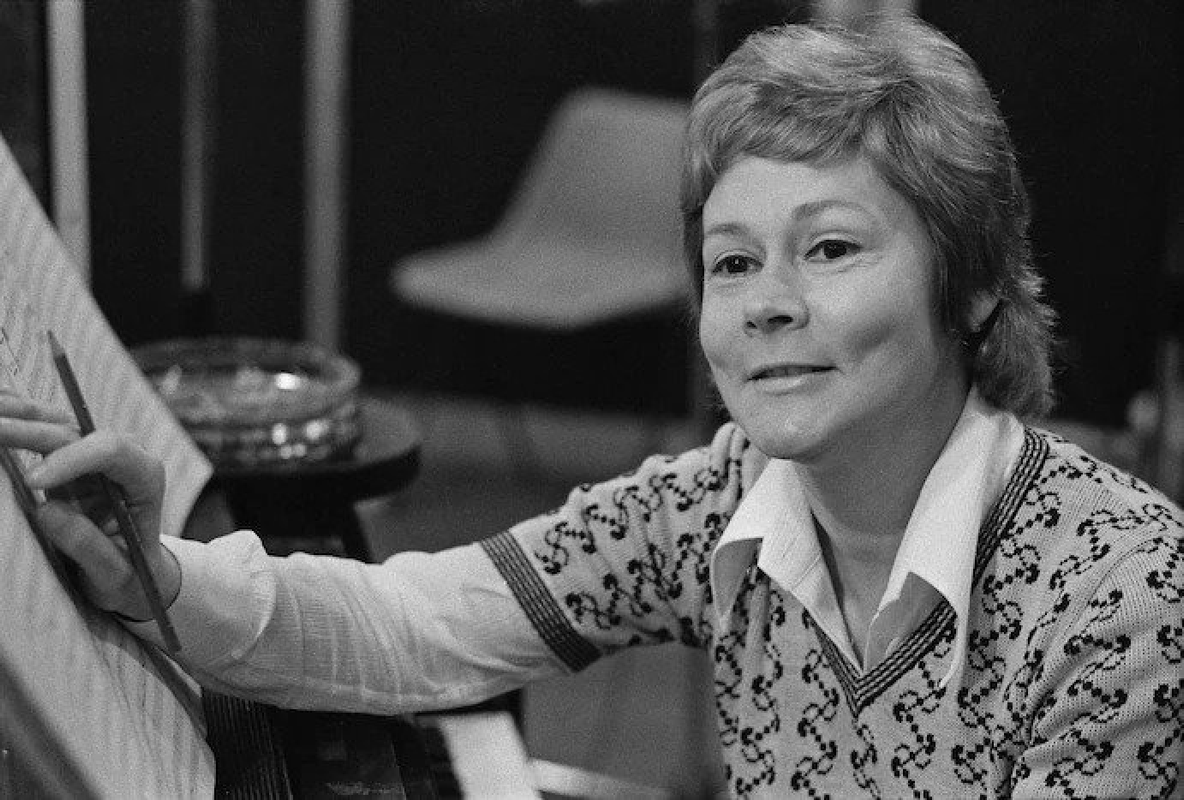
Anita Kerr in 1973. (Michael Putland/Getty Images)
Anita Kerr, whose gentle voice and ear-catching background arrangements transformed the sound of country music, replacing fiddles and steel guitars with string ensembles and lush choruses, died Oct. 10 at a nursing home in Geneva. She was 94.
Her daughter Kelley Kerr confirmed the death but did not provide a specific cause.
Ms. Kerr and her vocal ensemble, the Anita Kerr Singers, sang in the background for countless country music performers in the 1950s and ’60s, creating the Nashville Sound that sent Jim Reeves, Eddy Arnold, Skeeter Davis and Hank Snow, among many others, to the top of Billboard charts.
Because she and her quartet typically went uncredited on scores of albums — often “ooh”-ing and “aah”-ing behind the marquee performer — Ms. Kerr was often called “Little Miss Nobody,” a nickname she said she did not mind. Yet her sound and choruses are indelible. Anyone who hums the “dum-dum-dum, dooby-doo-wah” on Roy Orbison’s “Only the Lonely” is performing alongside the Kerr Singers.
The Anita Kerr Singers arrived on the Nashville scene at a pivotal time.
“Country just became more and more pop,” Ms. Kerr said in an interview for “Voices of the Country,” a collection of interviews with country music legends published in 2004. “If you got into the pop charts, you would sell much more than just being in the country charts.”
Kyle Young, chief executive of the Country Music Hall of Fame and Museum, said Ms. Kerr “helped Nashville achieve world-class stature as a music center through her roles as a gifted arranger, producer and leader of the lush vocal quartet the Anita Kerr Singers,” adding that “her voice and her creativity expanded the artistic and commercial possibilities for country music.”
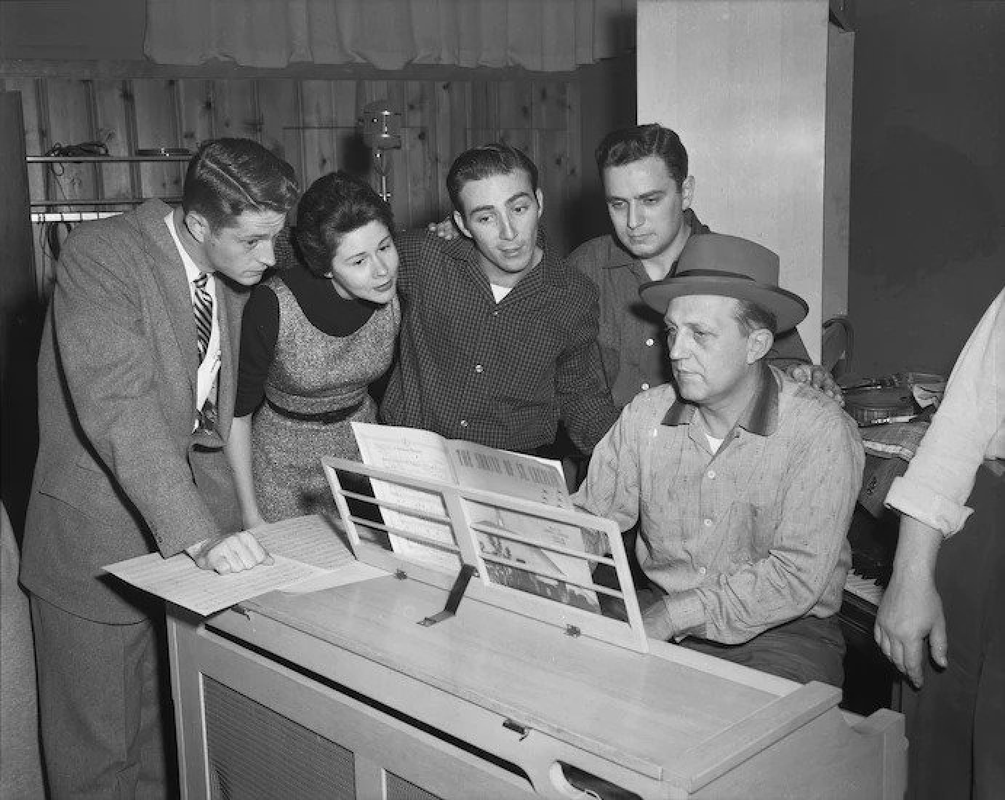
From left, Louis Nunley, Ms. Kerr, Faron Young, George Jellinek and Owen Bradley at Bradley Studios on Nashville’s Music Row in 1962. (Hubert Long Collection/Country Music Hall of Fame and Museum)
Anita Jean Grilli was born in Memphis on Oct. 13, 1927. Her father owned a grocery store, and her mother had a radio show. She began taking classical piano lessons at 4, first from a woman who lived up a hill in her neighborhood and then at her Catholic school. In fourth grade, she took up the pipe organ, playing at church and later at roller-skating rinks. After school, she arranged music for a singing group she formed with 14 female classmates. She also sang on the radio with her mother.
In 1947, she married Al Kerr, a radio announcer with whom she had two daughters, and a year later moved they moved to Nashville. Ms. Kerr, a petite, striking brunette, almost immediately made an impression in the male-dominated world of country music. She had a résumé of musical expertise — in classical, orchestra, harmonizing and arranging— that producers coveted.
Ms. Kerr, a soprano, formed a vocal group just “for the fun of singing and hearing my arrangements performed,” she later wrote. They scored a radio gig and got hired to sing backup for Red Foley. It was a totally new sound for Nashville. The quartet of Ms. Kerr, Gil Wright, Dottie Dillard and Louis Nunley linked up with producers such as Chet Atkins and Owen Bradley, both of whom had a vision for country music that didn’t include fiddles.
The Kerr Singers were in such demand that they regularly worked 18-hour days, bouncing from studio to studio with barely enough time to eat.
“We worked with the same musicians all the time,” Ms. Kerr said in the interview for “Voices of the Country.” “In fact, we knew them better probably than we knew our own families, because we were in the studio with them all the time.”
Producers often deferred to her. Atkins, she added in the book interview, “never changed notes on any of my arrangements. He never changed anything, even the little fills that the band was playing, where I really didn’t write out the notes, just the chords.”
The Anita Kerr Singers appeared regularly on the CBS show “Arthur Godfrey’s Talent Scouts” and released several albums under their own name. In a decision later seen as a testament to the conservative tastes of Grammy Award voters, the Nashville group’s skillful but straightforward tribute to composer Henry Mancini — “We Dig Mancini!” — bested the Beatles’ “Help!,” among other rock and pop albums, to win the Grammy for best performance by a vocal group in 1966.
A year earlier, after her first marriage ended in divorce, Ms. Kerr married Alex Grob, a Swiss businessman she had met on a tour of Europe, and they moved to Los Angeles. With her husband doubling as her manager, Ms. Kerr formed a new group of singers and worked in pop and jazz and on scores for orchestras and movies.
Ms. Kerr was also choral director on the “Smothers Brothers Comedy Hour” TV show before moving to Switzerland in 1970 to form and record with a third iteration of the Anita Kerr Singers.
In addition to her husband and daughter, survivors include another daughter, Suzanne Kerr Trebert; five grandchildren; and two great-grandchildren.
Early in her career, Ms. Kerr told the Tennessean newspaper that until she was 14, the only music she really knew was classical piano. After moving to Nashville, “I learned that there is something good in all music,” she said. “Good music is the music people enjoy. The more people who enjoy a song, the better it is. The best song ever written is no good if no one enjoys it.”
Anita Kerr, ‘Little Miss Nobody’ behind Nashville Sound, dies at 94
She replaced fiddles and steel guitars with more pop-like arrangements, transforming country music
By Michael S. Rosenwald
October 13, 2022

Anita Kerr in 1973. (Michael Putland/Getty Images)
Anita Kerr, whose gentle voice and ear-catching background arrangements transformed the sound of country music, replacing fiddles and steel guitars with string ensembles and lush choruses, died Oct. 10 at a nursing home in Geneva. She was 94.
Her daughter Kelley Kerr confirmed the death but did not provide a specific cause.
Ms. Kerr and her vocal ensemble, the Anita Kerr Singers, sang in the background for countless country music performers in the 1950s and ’60s, creating the Nashville Sound that sent Jim Reeves, Eddy Arnold, Skeeter Davis and Hank Snow, among many others, to the top of Billboard charts.
Because she and her quartet typically went uncredited on scores of albums — often “ooh”-ing and “aah”-ing behind the marquee performer — Ms. Kerr was often called “Little Miss Nobody,” a nickname she said she did not mind. Yet her sound and choruses are indelible. Anyone who hums the “dum-dum-dum, dooby-doo-wah” on Roy Orbison’s “Only the Lonely” is performing alongside the Kerr Singers.
The Anita Kerr Singers arrived on the Nashville scene at a pivotal time.
“Country just became more and more pop,” Ms. Kerr said in an interview for “Voices of the Country,” a collection of interviews with country music legends published in 2004. “If you got into the pop charts, you would sell much more than just being in the country charts.”
Kyle Young, chief executive of the Country Music Hall of Fame and Museum, said Ms. Kerr “helped Nashville achieve world-class stature as a music center through her roles as a gifted arranger, producer and leader of the lush vocal quartet the Anita Kerr Singers,” adding that “her voice and her creativity expanded the artistic and commercial possibilities for country music.”

From left, Louis Nunley, Ms. Kerr, Faron Young, George Jellinek and Owen Bradley at Bradley Studios on Nashville’s Music Row in 1962. (Hubert Long Collection/Country Music Hall of Fame and Museum)
Anita Jean Grilli was born in Memphis on Oct. 13, 1927. Her father owned a grocery store, and her mother had a radio show. She began taking classical piano lessons at 4, first from a woman who lived up a hill in her neighborhood and then at her Catholic school. In fourth grade, she took up the pipe organ, playing at church and later at roller-skating rinks. After school, she arranged music for a singing group she formed with 14 female classmates. She also sang on the radio with her mother.
In 1947, she married Al Kerr, a radio announcer with whom she had two daughters, and a year later moved they moved to Nashville. Ms. Kerr, a petite, striking brunette, almost immediately made an impression in the male-dominated world of country music. She had a résumé of musical expertise — in classical, orchestra, harmonizing and arranging— that producers coveted.
Ms. Kerr, a soprano, formed a vocal group just “for the fun of singing and hearing my arrangements performed,” she later wrote. They scored a radio gig and got hired to sing backup for Red Foley. It was a totally new sound for Nashville. The quartet of Ms. Kerr, Gil Wright, Dottie Dillard and Louis Nunley linked up with producers such as Chet Atkins and Owen Bradley, both of whom had a vision for country music that didn’t include fiddles.
The Kerr Singers were in such demand that they regularly worked 18-hour days, bouncing from studio to studio with barely enough time to eat.
“We worked with the same musicians all the time,” Ms. Kerr said in the interview for “Voices of the Country.” “In fact, we knew them better probably than we knew our own families, because we were in the studio with them all the time.”
Producers often deferred to her. Atkins, she added in the book interview, “never changed notes on any of my arrangements. He never changed anything, even the little fills that the band was playing, where I really didn’t write out the notes, just the chords.”
The Anita Kerr Singers appeared regularly on the CBS show “Arthur Godfrey’s Talent Scouts” and released several albums under their own name. In a decision later seen as a testament to the conservative tastes of Grammy Award voters, the Nashville group’s skillful but straightforward tribute to composer Henry Mancini — “We Dig Mancini!” — bested the Beatles’ “Help!,” among other rock and pop albums, to win the Grammy for best performance by a vocal group in 1966.
A year earlier, after her first marriage ended in divorce, Ms. Kerr married Alex Grob, a Swiss businessman she had met on a tour of Europe, and they moved to Los Angeles. With her husband doubling as her manager, Ms. Kerr formed a new group of singers and worked in pop and jazz and on scores for orchestras and movies.
Ms. Kerr was also choral director on the “Smothers Brothers Comedy Hour” TV show before moving to Switzerland in 1970 to form and record with a third iteration of the Anita Kerr Singers.
In addition to her husband and daughter, survivors include another daughter, Suzanne Kerr Trebert; five grandchildren; and two great-grandchildren.
Early in her career, Ms. Kerr told the Tennessean newspaper that until she was 14, the only music she really knew was classical piano. After moving to Nashville, “I learned that there is something good in all music,” she said. “Good music is the music people enjoy. The more people who enjoy a song, the better it is. The best song ever written is no good if no one enjoys it.”
- Bernie R
- Posts: 5693
- Joined: Thu Jan 10, 2008 9:30 am
- Location: Netherton
I know this thread was pretty much Dan's baby but I can't let the passing of Christine McVie go unmentioned; so, from The Guardian...
Fleetwood Mac singer and keyboardist who wrote many of the band’s canonical tunes, including Say You Love Me, Songbird and Don’t Stop
Fleetwood Mac were Brit-rock stalwarts when, in 1974, they hit on the idea of pepping up their lineup. They invited a folky Californian, Lindsey Buckingham, to join, but he refused to come without his girlfriend, Stevie Nicks. The band agreed, on one condition: their sole female member, Christine McVie, had to feel comfortable with Nicks.
They met over dinner in Los Angeles, and McVie, finding Nicks “funny and nice, but also, there was no competition”, waved her through. That decision led to the enlarged band becoming the sultans of soft rock, underlining McVie’s status as the quiet pillar of the Mac apparatus. (And she was right; Nicks complemented rather than competed. She was the ethereal conjuror, McVie the “very, very, very English” – in Nicks’s appraisal – countermeasure, and neither ever upstaged the other.)
McVie, who has died aged 79, was co-lead singer, keyboardist and author of many of the group’s canonical tunes, including Say You Love Me, Over My Head and You Make Loving Fun. Understatement shaped her identity, with Rolling Stone magazine rather insultingly calling her “the epitome of rock’n’roll sanity”. That kind of thing riled her: “I was probably the most restrained, but I was no angel,” she protested, claiming that one of her most acclaimed compositions, Songbird, owed its existence to “a couple of toots of cocaine and a half-bottle of champagne”.
Nevertheless, she avoided the spotlight, often literally. At gigs her domain was a relatively modest keyboard set-up at the side, safely away from stage centre, and despite her talent – “the finest blueswoman and piano player in all of England,” the drummer, Mick Fleetwood, maintained – she was self-deprecating about her abilities.
Deeply melodic love songs, burnished by her warm alto, were McVie’s stock in trade, but she could address her unhappy ex-husband, John McVie, with equal tenderness. The 1977 Top 3 hit Don’t Stop, later used as the theme tune for Bill Clinton’s first presidential campaign, did just that. Written during sessions for the landmark Rumours album, when relations between the pair were at their worst, it sunnily encouraged John, the band’s bassist, to look forward rather than brood about the past. (She blamed their periodic break-ups, culminating in divorce in 1976, on the stress of being in the same group, and her husband’s heavy drinking: “John is not the most pleasant of people when he’s drunk,” she said in 2003. “I was seeing more Hyde than Jekyll.”)
She didn’t deliberately write commercial songs, she insisted; they just came out that way. Which was just as well – in 1975, as the group were grinding through an American tour, their US label chose Over My Head to soundtrack a radio campaign for their self-titled new album. The LP duly became their first real smash, selling more than 9m copies. For that matter, the 1977 behemoth Rumours arguably owed a good chunk of its 45m sales to the two McVie tracks released as singles, Don’t Stop and You Make Loving Fun, which remain soft-rock touchstones to this day.
The younger child of Cyril Perfect, a music teacher, and his wife, Beatrice (nee Reece), Christine was born in Bouth, then part of Lancashire and now in Cumbria, and raised in Bearwood, West Midlands. Her mother’s avocation was spirituality and Christine was uncomfortable around her circle of faith-healer friends, but an even heavier burden was being saddled with the name Christine Perfect. “Teachers would say: ‘I hope you live up to your name, Christine.’ So, yes, it was tough.” She so disliked it that after her divorce she kept her married name.
As a child, she studied classical piano and cello, only becoming interested in rock at 15, when her brother left Fats Domino sheet music on the household piano. She was an instant convert to the blues, developing a driving, boogie-woogie left-hand piano style, but music became secondary to her other consuming interest, art. Five years at Birmingham Art College yielded a sculpture degree, but she emerged with a revived passion for music, thanks to having spent her university time busking with her friend Spencer Davis and playing bass in a band called Sounds of Blue, led by Stan Webb.
Listlessly working as a window dresser at Dickins & Jones department store in London after graduation, Christine was delighted to be asked to join Webb’s new outfit, Chicken Shack, as keyboardist and vocalist. One of the only women in the mid-1960s British blues scene to both sing and play an instrument, she got noticed. Though she later dismissed Chicken Shack as a “mediocre sort of white blues band”, she sang lead on their only Top 20 song, a dreamy cover of Etta James’s I’d Rather Go Blind, and was voted Melody Maker’s top female vocalist of 1969 (she won the same award in 1970, after releasing a solo album entitled Christine Perfect).
She fancied the guitarist Peter Green of the rival blues act Fleetwood Mac, but it was John McVie who asked her out. “It was Peter Green I had a bit of an eye on,” she said during a Desert Island Discs broadcast in 2017. “I started talking to John and fell head over heels with him.” They married in 1968, and a few months later, deciding she was not seeing enough of her husband, she left Chicken Shack with the intention of being a housewife. It lasted only until her manager persuaded her to make the solo LP, an “immature” effort she later preferred to forget. The next step was joining Fleetwood Mac as a permanent member in 1970, having already played uncredited on several studio sessions.
She was dubious about the band’s decision to relocate to Los Angeles in 1974, but reconciled herself to Californian rock-star life, buying Anthony Newley’s old house and a pair of Mercedes-Benzes with her lhasa apso dogs’ names on the number plates. While making the follow-up to Rumours, Tusk, she dated the Beach Boy Dennis Wilson, but her next significant relationship, with the Portuguese keyboardist Eddy Quintela, was happier and more productive. He played on her second solo album, Christine McVie (1984), and after their marriage in 1986 the pair wrote one of Mac’s biggest hits of the 80s, Little Lies. The marriage foundered, however, when McVie found herself craving a quiet life in England; she quit the band in 1998 and bought a Tudor house in Wickhambreaux, Kent.
Fifteen years of “this country life with the welly boots and the dogs and the Range Rover” proved enough, and matters definitively came to a head when she fell down a flight of stairs and became dependent on prescription painkillers. It was, she said, a bleak time, not least because another attempt at a solo career had failed to launch. She had made the album In the Meantime with her nephew, Dan Perfect, in 2004, purposely veering away from Fleetwood Mac’s big-ticket lushness. But without it, the relaxed, mid-tempo songs had little zing; moreover, a fear of flying kept her from travelling to promote it. Innately a team player, after therapy to overcome her phobia she rejoined Mac permanently in 2014.
Reaction to her return was roaringly positive, both from fans and the band themselves; to Mick Fleetwood, it made the group “complete” again. In the same year, she received an Ivor Novello lifetime achievement award. McVie’s last recording was a self-titled joint album with Buckingham, a Top 5 British hit in 2017. It caught her in a reflective mood but her gift for melody was undimmed. Her final public performance was at a tribute show for Green in London in February 2020.
Christine McVie performing in Amsterdam, 2015. Photograph: Paul Bergen/EPA/Shutterstock
In June this year, a solo compilation, Songbird, was released, but McVie was adamant that she wouldn’t tour again. “I don’t feel physically up for it. I’m in quite bad health. I’ve got a chronic back problem, which debilitates me. I stand up to play the piano, so I don’t know if I could actually physically do it.”
She and Quintela divorced in 2003. Her brother, John, and nephew survive her.
Anne Christine McVie, musician, born 12 July 1943; died 30 November 2022
Fleetwood Mac singer and keyboardist who wrote many of the band’s canonical tunes, including Say You Love Me, Songbird and Don’t Stop
Fleetwood Mac were Brit-rock stalwarts when, in 1974, they hit on the idea of pepping up their lineup. They invited a folky Californian, Lindsey Buckingham, to join, but he refused to come without his girlfriend, Stevie Nicks. The band agreed, on one condition: their sole female member, Christine McVie, had to feel comfortable with Nicks.
They met over dinner in Los Angeles, and McVie, finding Nicks “funny and nice, but also, there was no competition”, waved her through. That decision led to the enlarged band becoming the sultans of soft rock, underlining McVie’s status as the quiet pillar of the Mac apparatus. (And she was right; Nicks complemented rather than competed. She was the ethereal conjuror, McVie the “very, very, very English” – in Nicks’s appraisal – countermeasure, and neither ever upstaged the other.)
McVie, who has died aged 79, was co-lead singer, keyboardist and author of many of the group’s canonical tunes, including Say You Love Me, Over My Head and You Make Loving Fun. Understatement shaped her identity, with Rolling Stone magazine rather insultingly calling her “the epitome of rock’n’roll sanity”. That kind of thing riled her: “I was probably the most restrained, but I was no angel,” she protested, claiming that one of her most acclaimed compositions, Songbird, owed its existence to “a couple of toots of cocaine and a half-bottle of champagne”.
Nevertheless, she avoided the spotlight, often literally. At gigs her domain was a relatively modest keyboard set-up at the side, safely away from stage centre, and despite her talent – “the finest blueswoman and piano player in all of England,” the drummer, Mick Fleetwood, maintained – she was self-deprecating about her abilities.
Deeply melodic love songs, burnished by her warm alto, were McVie’s stock in trade, but she could address her unhappy ex-husband, John McVie, with equal tenderness. The 1977 Top 3 hit Don’t Stop, later used as the theme tune for Bill Clinton’s first presidential campaign, did just that. Written during sessions for the landmark Rumours album, when relations between the pair were at their worst, it sunnily encouraged John, the band’s bassist, to look forward rather than brood about the past. (She blamed their periodic break-ups, culminating in divorce in 1976, on the stress of being in the same group, and her husband’s heavy drinking: “John is not the most pleasant of people when he’s drunk,” she said in 2003. “I was seeing more Hyde than Jekyll.”)
She didn’t deliberately write commercial songs, she insisted; they just came out that way. Which was just as well – in 1975, as the group were grinding through an American tour, their US label chose Over My Head to soundtrack a radio campaign for their self-titled new album. The LP duly became their first real smash, selling more than 9m copies. For that matter, the 1977 behemoth Rumours arguably owed a good chunk of its 45m sales to the two McVie tracks released as singles, Don’t Stop and You Make Loving Fun, which remain soft-rock touchstones to this day.
The younger child of Cyril Perfect, a music teacher, and his wife, Beatrice (nee Reece), Christine was born in Bouth, then part of Lancashire and now in Cumbria, and raised in Bearwood, West Midlands. Her mother’s avocation was spirituality and Christine was uncomfortable around her circle of faith-healer friends, but an even heavier burden was being saddled with the name Christine Perfect. “Teachers would say: ‘I hope you live up to your name, Christine.’ So, yes, it was tough.” She so disliked it that after her divorce she kept her married name.
As a child, she studied classical piano and cello, only becoming interested in rock at 15, when her brother left Fats Domino sheet music on the household piano. She was an instant convert to the blues, developing a driving, boogie-woogie left-hand piano style, but music became secondary to her other consuming interest, art. Five years at Birmingham Art College yielded a sculpture degree, but she emerged with a revived passion for music, thanks to having spent her university time busking with her friend Spencer Davis and playing bass in a band called Sounds of Blue, led by Stan Webb.
Listlessly working as a window dresser at Dickins & Jones department store in London after graduation, Christine was delighted to be asked to join Webb’s new outfit, Chicken Shack, as keyboardist and vocalist. One of the only women in the mid-1960s British blues scene to both sing and play an instrument, she got noticed. Though she later dismissed Chicken Shack as a “mediocre sort of white blues band”, she sang lead on their only Top 20 song, a dreamy cover of Etta James’s I’d Rather Go Blind, and was voted Melody Maker’s top female vocalist of 1969 (she won the same award in 1970, after releasing a solo album entitled Christine Perfect).
She fancied the guitarist Peter Green of the rival blues act Fleetwood Mac, but it was John McVie who asked her out. “It was Peter Green I had a bit of an eye on,” she said during a Desert Island Discs broadcast in 2017. “I started talking to John and fell head over heels with him.” They married in 1968, and a few months later, deciding she was not seeing enough of her husband, she left Chicken Shack with the intention of being a housewife. It lasted only until her manager persuaded her to make the solo LP, an “immature” effort she later preferred to forget. The next step was joining Fleetwood Mac as a permanent member in 1970, having already played uncredited on several studio sessions.
She was dubious about the band’s decision to relocate to Los Angeles in 1974, but reconciled herself to Californian rock-star life, buying Anthony Newley’s old house and a pair of Mercedes-Benzes with her lhasa apso dogs’ names on the number plates. While making the follow-up to Rumours, Tusk, she dated the Beach Boy Dennis Wilson, but her next significant relationship, with the Portuguese keyboardist Eddy Quintela, was happier and more productive. He played on her second solo album, Christine McVie (1984), and after their marriage in 1986 the pair wrote one of Mac’s biggest hits of the 80s, Little Lies. The marriage foundered, however, when McVie found herself craving a quiet life in England; she quit the band in 1998 and bought a Tudor house in Wickhambreaux, Kent.
Fifteen years of “this country life with the welly boots and the dogs and the Range Rover” proved enough, and matters definitively came to a head when she fell down a flight of stairs and became dependent on prescription painkillers. It was, she said, a bleak time, not least because another attempt at a solo career had failed to launch. She had made the album In the Meantime with her nephew, Dan Perfect, in 2004, purposely veering away from Fleetwood Mac’s big-ticket lushness. But without it, the relaxed, mid-tempo songs had little zing; moreover, a fear of flying kept her from travelling to promote it. Innately a team player, after therapy to overcome her phobia she rejoined Mac permanently in 2014.
Reaction to her return was roaringly positive, both from fans and the band themselves; to Mick Fleetwood, it made the group “complete” again. In the same year, she received an Ivor Novello lifetime achievement award. McVie’s last recording was a self-titled joint album with Buckingham, a Top 5 British hit in 2017. It caught her in a reflective mood but her gift for melody was undimmed. Her final public performance was at a tribute show for Green in London in February 2020.
Christine McVie performing in Amsterdam, 2015. Photograph: Paul Bergen/EPA/Shutterstock
In June this year, a solo compilation, Songbird, was released, but McVie was adamant that she wouldn’t tour again. “I don’t feel physically up for it. I’m in quite bad health. I’ve got a chronic back problem, which debilitates me. I stand up to play the piano, so I don’t know if I could actually physically do it.”
She and Quintela divorced in 2003. Her brother, John, and nephew survive her.
Anne Christine McVie, musician, born 12 July 1943; died 30 November 2022
Born and raised in Romeo Street, later Lambeth Walk, Jersey Close, Garden Place, Hawthorne Rd, Gonville Rd now Netherton
-
Gardner 180
- Posts: 439
- Joined: Sun Dec 02, 2018 6:17 pm
I am saddened to announce that " Hi-De-Hi " Ruth Madoc passed away yesterday aged 79 years.
Rest in peace Ruth.
Ray.
Rest in peace Ruth.
Ray.
-
Paul McCabe
- Posts: 294
- Joined: Thu Aug 14, 2008 12:00 pm
- Location: Bootle, Merseyside
Just a nod here to 'Dan' the poster of such interesting & quirky gems.
- - - - - - - - - - - -
RIP Ann Summers
Jacqueline Gold, who made a name for herself as the founder of popular British high street retailer Ann Summers, has died after battling breast cancer for seven years.
The businesswoman was surrounded by her husband Dan Cunningham, daughter Scarlett, sister Vanessa and brother-in-law Nick when she passed away on Thursday evening (16 March) at the age of 62, a family statement said.
The statement confirmed her death “with unspeakable sadness”, while Vanessa added that Gold had “courageously battled stage four breast cancer for seven years and was an absolute warrior throughout her cancer journey”. She described her older sister as a “trailblazer, a visionary and the most incredible woman” in life.
Gold was born on 16 July 1960 to renowned businessman David Gold and Beryl Hunt. According to the BBC, her father cried when she was born because he wanted a son. She went on to transform the Ann Summers business into a high-street staple, in the UK and beyond.
David owned Gold Group International (GGI), the parent company of Ann Summers and lingerie chain Knickerbox. He also co-owned Gold Star Publication (GSP), an adult magazine company, with his brother Ralph.
- - - - - - - - - - - -
RIP Ann Summers
Jacqueline Gold, who made a name for herself as the founder of popular British high street retailer Ann Summers, has died after battling breast cancer for seven years.
The businesswoman was surrounded by her husband Dan Cunningham, daughter Scarlett, sister Vanessa and brother-in-law Nick when she passed away on Thursday evening (16 March) at the age of 62, a family statement said.
The statement confirmed her death “with unspeakable sadness”, while Vanessa added that Gold had “courageously battled stage four breast cancer for seven years and was an absolute warrior throughout her cancer journey”. She described her older sister as a “trailblazer, a visionary and the most incredible woman” in life.
Gold was born on 16 July 1960 to renowned businessman David Gold and Beryl Hunt. According to the BBC, her father cried when she was born because he wanted a son. She went on to transform the Ann Summers business into a high-street staple, in the UK and beyond.
David owned Gold Group International (GGI), the parent company of Ann Summers and lingerie chain Knickerbox. He also co-owned Gold Star Publication (GSP), an adult magazine company, with his brother Ralph.
-
Paul McCabe
- Posts: 294
- Joined: Thu Aug 14, 2008 12:00 pm
- Location: Bootle, Merseyside
RIP Paul / Lily
= = = = = = = =
Obituary
Paul O’Grady obituary
Comedian, broadcaster and chat-show host who shot to widespread fame in the 1990s as his alter ego Lily Savage
Stuart Jeffries
Wed 29 Mar 2023 15.12 BST
74
In 2010, Paul O’Grady broke his nose after losing his footing at his friend Cilla Black’s house in Barbados. “My nose was out to here and I had a black eye, but I said: ‘I’m not ruining my holiday,’” he recalled. “So we went out every night and were the talk of the island.” The story was typical of O’Grady, who loved to dramatise his indomitability and had an unquenchable desire to be in the public eye.
The comedian and chat show host, who has died aged 67, was once called “the Edith Piaf of day-time television” and, given its connotations of a drama-filled life, he loved the epithet.
His defiant unshakeability and desire to perform came together in his first stage persona, the foul-mouthed Lily Savage, who sported a platinum blond beehive wig, vast quantities of makeup, white stilettos, a leopardskin miniskirt and a matching fake-fur coat. Born in the 1980s in the gay pubs of south London, as a sideline to O’Grady’s day job as a care worker, Savage thrived on insulting audiences and made no effort to conceal a streak of hard-headed lawlessness (“You need two things in a riot – flat shoes and a pram”).
She also hinted at a lurid past as a down-at-heel sex worker and made the work of previous British female impersonators, such as Danny La Rue and Dick Emery, seem tame.
Savage was inspired, in part, by O’Grady’s Aunt Chrissie, a bus conductor. “She had a hard life, but she used to suck her cheeks in and fancy herself as Marlene Dietrich,” he said.
Lily Savage presented the BBC’s celebrity game show Blankety Blank in the late 1990s.
Lily Savage presented the BBC’s celebrity game show Blankety Blank in the late 1990s. Photograph: Fremantle Media/Shutterstock
His alter ego acted as a kind of avenging angel, giving voice to the anger O’Grady was otherwise unable to express.
Savage eventually became a phenomenon, appearing on the BBC, ITV and Channel 4. She presented the BBC celebrity game show Blankety Blank (1997–99) and the ITV comedy show Lily Live! (2000-01). She even returned in triumph to her native Merseyside, and became a regular on This Morning with Richard and Judy.
But O’Grady killed off Savage in 2005, claiming Lily had “seen the light, taken the veil and packed herself off to a convent in France”. Thereafter he took centre stage as himself. As the host of the Paul O’Grady Show and Paul O’Grady Live he could be just as caustic as Savage.
In 2010 he provoked complaints to Ofcom for attacking the new coalition government during Paul O’Grady Live. “Do you know what got my back up?” he told his ITV audience. “Those Tories hooping and hollering when they heard about the cuts. Gonna scrap the pensions – yeah! – no more wheelchairs – yeah! ... I bet when they were children they laughed at Bambi when the mother got shot.”
O’Grady was born in Birkenhead to Catholic parents, an Irish father, Paddy, and English mother, Molly (nee Savage). “I was born late – what my mother calls the last kick of a dying horse,” he said in his 2009 autobiography At My Mother’s Knee … And Other Low Joints.
“There’s three of us children, but I’m 13 or 14 years younger than my brother and sister. When I look back on my childhood I have no bad memories. Our family was loving and full of affection. I never knew what divorce was until I moved to London. I was an indulged child and completely protected from anything bad.” Not quite true: he was sent by his parents to a school run by the Christian Brothers. “They were wicked, wicked,” he told an interviewer.
Paul O’Grady was a great animal lover.
Paul O’Grady was a great animal lover. Photograph: Joe Murphy/RSPCA/PA
O’Grady left school at 16 to work for the DHSS (Department of Health and Social Security) in Liverpool, and then went on to a string of jobs – hotel skivvy, office worker at an abattoir, and clerk at a magistrates court.
In the 70s he worked for Camden council in north London as a peripatetic carer. “If a single mother had to go to hospital, I’d move in and look after her kids so they didn’t have to go into care,” he once explained. “Often there’d be a drunken father turning up at 2am, wanting to know who I was, and I’d say, mincing slightly: ‘I’m from Camden council!’ and he’d smack me. So I’d be going around with a black eye and nits from the kids.” He cited this period of his life as part inspiration, along with his Birkenhead female relations, for the Lily Savage character.
In the 80s, Savage had a solo residency at the Royal Vauxhall Tavern in London that ran for eight years. Each night his waspish patter spared no one, not even the boys in blue. One night in 1987, his performance was rudely interrupted by a police raid, one that many of the gay club’s punters took to be a homophobic attempt to intimidate them.
Thirty-five officers burst in wearing rubber gloves – this being the height of the Aids epidemic, they feared touching those they arrested. According to the veteran LGBTQ+ campaigner Peter Tatchell, O’Grady at first thought they were strippers and part of the show.
In 2021, O’Grady described what happened next: “I was doing the late show and within seconds the place was heaving with coppers, all wearing rubber gloves. I remember saying something like, ‘Well well, it looks like we’ve got help with the washing up.’” He was handcuffed and taken to the police station before being released without charge. “They made many arrests but we were a stoic lot and it was business as usual the next night.”
While working as a court clerk, he had an affair with a colleague, Diane Jansen, who became pregnant with their daughter, Sharyn. In 1977 he married Teresa Fernandes, a Portuguese woman, in order to prevent her deportation from the UK. The couple divorced in 2005.
O’Grady claimed there was always an unspoken understanding in his family that he was gay. “It was no big deal. I never stood up in the front room and said, ‘I have something to tell you!’ – but I wasn’t hiding anything.”
During the mid-80s he met Brendan Murphy, the manager of a sauna in south London. They were a couple until Murphy’s death from brain cancer in 2005.
By then O’Grady was a popular household name, and in 2008 he was appointed MBE. Three years later, the Museum of Liverpool staged an exhibition of his alter ego’s frocks. In 2011 he quit Paul O’Grady Live after becoming exasperated with his role as a chat- show host: “I felt part of the PR machine. They’d want this guest or that guest. Every question had to go through the lawyers. I was just another plug for someone’s book.”
He went on to make shows such as ITV’s For the Love of Dogs, Me and My Guide Dog, a documentary about the burlesque performer Gypsy Rose Lee, and a series for the BBC, Paul O’Grady’s Working Britain. A two-part eulogy to the British working class, broadcast in 2013, it prompted press scepticism – not least because O’Grady told viewers he still considered himself working class despite being a millionaire who owned a generous plot of land in Kent.
He lived there with 14 sheep, three dogs, two pigs, hundreds of rescued chickens, ducks, a goat and barn owls. After Murphy’s death he had a long-term relationship with the former ballet dancer Andre Portasio, whom he married in 2017.
Paul O’Grady as Roxanne in The Bill, 1989, with Tony Scannell as DS Roach.
Paul O’Grady as Roxanne in The Bill, 1989, with Tony Scannell as DS Roach. Photograph: Fremantle Media/Shutterstock
Lily Savage returned from her French convent to perform as Widow Twankey in pantomime in Southampton in 2011 and London in 2012. In 2017, O’Grady hosted a Channel 5 reboot of Blind Date; and in 2021 the ITV celebrity game show Paul O’Grady’s Saturday Night Line Up.
During lockdown, he wrote a children’s book, Eddie Albert and the Amazing Animal Gang (2021). Last year he made a special one-off episode of For the Love of Dogs to mark 160 years of Battersea Dogs and Cats Home, for which he was an ambassador. In August 2022, he presented his last show on BBC Radio 2 after 14 years on the airwaves.
Tatchell said of O’Grady: “Paul wasn’t just a brilliant comedian and broadcast personality but a much admired campaigner for LGBT+ equality and animal rights … Paul was planning to lead our forthcoming campaign for the police to apologise for their historic persecution of the LGBT+ community.” His fellow TV presenter Lorraine Kelly said that O’Grady was “the kindest, funniest man … Dogs are the best judge of character and they loved him.”
He is survived by Andre, Sharyn, and two grandchildren, Abel and Halo, and by his brother, Ben, and sister, Sheila.
Paul James O’Grady, comedian and chat-show host, born 14 June 1955; died 28 March 2023
= = = = = = = =
Obituary
Paul O’Grady obituary
Comedian, broadcaster and chat-show host who shot to widespread fame in the 1990s as his alter ego Lily Savage
Stuart Jeffries
Wed 29 Mar 2023 15.12 BST
74
In 2010, Paul O’Grady broke his nose after losing his footing at his friend Cilla Black’s house in Barbados. “My nose was out to here and I had a black eye, but I said: ‘I’m not ruining my holiday,’” he recalled. “So we went out every night and were the talk of the island.” The story was typical of O’Grady, who loved to dramatise his indomitability and had an unquenchable desire to be in the public eye.
The comedian and chat show host, who has died aged 67, was once called “the Edith Piaf of day-time television” and, given its connotations of a drama-filled life, he loved the epithet.
His defiant unshakeability and desire to perform came together in his first stage persona, the foul-mouthed Lily Savage, who sported a platinum blond beehive wig, vast quantities of makeup, white stilettos, a leopardskin miniskirt and a matching fake-fur coat. Born in the 1980s in the gay pubs of south London, as a sideline to O’Grady’s day job as a care worker, Savage thrived on insulting audiences and made no effort to conceal a streak of hard-headed lawlessness (“You need two things in a riot – flat shoes and a pram”).
She also hinted at a lurid past as a down-at-heel sex worker and made the work of previous British female impersonators, such as Danny La Rue and Dick Emery, seem tame.
Savage was inspired, in part, by O’Grady’s Aunt Chrissie, a bus conductor. “She had a hard life, but she used to suck her cheeks in and fancy herself as Marlene Dietrich,” he said.
Lily Savage presented the BBC’s celebrity game show Blankety Blank in the late 1990s.
Lily Savage presented the BBC’s celebrity game show Blankety Blank in the late 1990s. Photograph: Fremantle Media/Shutterstock
His alter ego acted as a kind of avenging angel, giving voice to the anger O’Grady was otherwise unable to express.
Savage eventually became a phenomenon, appearing on the BBC, ITV and Channel 4. She presented the BBC celebrity game show Blankety Blank (1997–99) and the ITV comedy show Lily Live! (2000-01). She even returned in triumph to her native Merseyside, and became a regular on This Morning with Richard and Judy.
But O’Grady killed off Savage in 2005, claiming Lily had “seen the light, taken the veil and packed herself off to a convent in France”. Thereafter he took centre stage as himself. As the host of the Paul O’Grady Show and Paul O’Grady Live he could be just as caustic as Savage.
In 2010 he provoked complaints to Ofcom for attacking the new coalition government during Paul O’Grady Live. “Do you know what got my back up?” he told his ITV audience. “Those Tories hooping and hollering when they heard about the cuts. Gonna scrap the pensions – yeah! – no more wheelchairs – yeah! ... I bet when they were children they laughed at Bambi when the mother got shot.”
O’Grady was born in Birkenhead to Catholic parents, an Irish father, Paddy, and English mother, Molly (nee Savage). “I was born late – what my mother calls the last kick of a dying horse,” he said in his 2009 autobiography At My Mother’s Knee … And Other Low Joints.
“There’s three of us children, but I’m 13 or 14 years younger than my brother and sister. When I look back on my childhood I have no bad memories. Our family was loving and full of affection. I never knew what divorce was until I moved to London. I was an indulged child and completely protected from anything bad.” Not quite true: he was sent by his parents to a school run by the Christian Brothers. “They were wicked, wicked,” he told an interviewer.
Paul O’Grady was a great animal lover.
Paul O’Grady was a great animal lover. Photograph: Joe Murphy/RSPCA/PA
O’Grady left school at 16 to work for the DHSS (Department of Health and Social Security) in Liverpool, and then went on to a string of jobs – hotel skivvy, office worker at an abattoir, and clerk at a magistrates court.
In the 70s he worked for Camden council in north London as a peripatetic carer. “If a single mother had to go to hospital, I’d move in and look after her kids so they didn’t have to go into care,” he once explained. “Often there’d be a drunken father turning up at 2am, wanting to know who I was, and I’d say, mincing slightly: ‘I’m from Camden council!’ and he’d smack me. So I’d be going around with a black eye and nits from the kids.” He cited this period of his life as part inspiration, along with his Birkenhead female relations, for the Lily Savage character.
In the 80s, Savage had a solo residency at the Royal Vauxhall Tavern in London that ran for eight years. Each night his waspish patter spared no one, not even the boys in blue. One night in 1987, his performance was rudely interrupted by a police raid, one that many of the gay club’s punters took to be a homophobic attempt to intimidate them.
Thirty-five officers burst in wearing rubber gloves – this being the height of the Aids epidemic, they feared touching those they arrested. According to the veteran LGBTQ+ campaigner Peter Tatchell, O’Grady at first thought they were strippers and part of the show.
In 2021, O’Grady described what happened next: “I was doing the late show and within seconds the place was heaving with coppers, all wearing rubber gloves. I remember saying something like, ‘Well well, it looks like we’ve got help with the washing up.’” He was handcuffed and taken to the police station before being released without charge. “They made many arrests but we were a stoic lot and it was business as usual the next night.”
While working as a court clerk, he had an affair with a colleague, Diane Jansen, who became pregnant with their daughter, Sharyn. In 1977 he married Teresa Fernandes, a Portuguese woman, in order to prevent her deportation from the UK. The couple divorced in 2005.
O’Grady claimed there was always an unspoken understanding in his family that he was gay. “It was no big deal. I never stood up in the front room and said, ‘I have something to tell you!’ – but I wasn’t hiding anything.”
During the mid-80s he met Brendan Murphy, the manager of a sauna in south London. They were a couple until Murphy’s death from brain cancer in 2005.
By then O’Grady was a popular household name, and in 2008 he was appointed MBE. Three years later, the Museum of Liverpool staged an exhibition of his alter ego’s frocks. In 2011 he quit Paul O’Grady Live after becoming exasperated with his role as a chat- show host: “I felt part of the PR machine. They’d want this guest or that guest. Every question had to go through the lawyers. I was just another plug for someone’s book.”
He went on to make shows such as ITV’s For the Love of Dogs, Me and My Guide Dog, a documentary about the burlesque performer Gypsy Rose Lee, and a series for the BBC, Paul O’Grady’s Working Britain. A two-part eulogy to the British working class, broadcast in 2013, it prompted press scepticism – not least because O’Grady told viewers he still considered himself working class despite being a millionaire who owned a generous plot of land in Kent.
He lived there with 14 sheep, three dogs, two pigs, hundreds of rescued chickens, ducks, a goat and barn owls. After Murphy’s death he had a long-term relationship with the former ballet dancer Andre Portasio, whom he married in 2017.
Paul O’Grady as Roxanne in The Bill, 1989, with Tony Scannell as DS Roach.
Paul O’Grady as Roxanne in The Bill, 1989, with Tony Scannell as DS Roach. Photograph: Fremantle Media/Shutterstock
Lily Savage returned from her French convent to perform as Widow Twankey in pantomime in Southampton in 2011 and London in 2012. In 2017, O’Grady hosted a Channel 5 reboot of Blind Date; and in 2021 the ITV celebrity game show Paul O’Grady’s Saturday Night Line Up.
During lockdown, he wrote a children’s book, Eddie Albert and the Amazing Animal Gang (2021). Last year he made a special one-off episode of For the Love of Dogs to mark 160 years of Battersea Dogs and Cats Home, for which he was an ambassador. In August 2022, he presented his last show on BBC Radio 2 after 14 years on the airwaves.
Tatchell said of O’Grady: “Paul wasn’t just a brilliant comedian and broadcast personality but a much admired campaigner for LGBT+ equality and animal rights … Paul was planning to lead our forthcoming campaign for the police to apologise for their historic persecution of the LGBT+ community.” His fellow TV presenter Lorraine Kelly said that O’Grady was “the kindest, funniest man … Dogs are the best judge of character and they loved him.”
He is survived by Andre, Sharyn, and two grandchildren, Abel and Halo, and by his brother, Ben, and sister, Sheila.
Paul James O’Grady, comedian and chat-show host, born 14 June 1955; died 28 March 2023
-
Paul McCabe
- Posts: 294
- Joined: Thu Aug 14, 2008 12:00 pm
- Location: Bootle, Merseyside
RIP Jerry Springer (Taken from Atlantic by Megan Garber USA)
The chants of his name defined a decade: “Jerry! Jerry! Jerry!”
Jerry Springer died today at 79. His most obvious legacy will be the syndicated talk show that bore his name—one that embodied the frenetic voyeurism of the American ’90s. Sex, affairs, secret children, incest, love triangles, love trapezoids, more sex, people wrestling and sparring and throwing chairs at one another: The Jerry Springer Show was the tabloids come to life. The program democratized scandal and then exploited it. It allowed its viewers to peer into the lives not of celebrities, but of everyday people. It was gaudy and sad and insulting and irresistible.
Springer’s show, in that way, predicted our current moment even as it embodied its own. It was TikTok before TikTok, Twitter before Twitter, the logic of reality TV wrangled onto the set of a talk show. The most revealing element of The Jerry Springer Show, though, isn’t its scandal-mongering. It’s that the show, like its host, had its roots in politics.
Springer was born in London, in 1944, to Jewish Holocaust refugees. After coming to the U.S. as a child, he studied politics at Tulane University and received a law degree from Northwestern University. He embarked on a career in politics: Springer worked as an adviser to Robert Kennedy and served as the mayor of Cincinnati in the late 1970s. He ran for governor of Ohio—but then, after that attempt proved unsuccessful, he switched careers. He became a reporter at a local TV station and rose up to become an anchor. In 1991, he debuted The Jerry Springer Show. It began as a political talk show in the Phil Donahue vein: social issues and current events, high-minded discussions of politics. It was, like most talk shows of that time, relatively sedate. It featured conversations about gun violence and homelessness. Its guests included commentators such as Oliver North and Jesse Jackson.
Megan Garber is a staff writer at The Atlantic.
The chants of his name defined a decade: “Jerry! Jerry! Jerry!”
Jerry Springer died today at 79. His most obvious legacy will be the syndicated talk show that bore his name—one that embodied the frenetic voyeurism of the American ’90s. Sex, affairs, secret children, incest, love triangles, love trapezoids, more sex, people wrestling and sparring and throwing chairs at one another: The Jerry Springer Show was the tabloids come to life. The program democratized scandal and then exploited it. It allowed its viewers to peer into the lives not of celebrities, but of everyday people. It was gaudy and sad and insulting and irresistible.
Springer’s show, in that way, predicted our current moment even as it embodied its own. It was TikTok before TikTok, Twitter before Twitter, the logic of reality TV wrangled onto the set of a talk show. The most revealing element of The Jerry Springer Show, though, isn’t its scandal-mongering. It’s that the show, like its host, had its roots in politics.
Springer was born in London, in 1944, to Jewish Holocaust refugees. After coming to the U.S. as a child, he studied politics at Tulane University and received a law degree from Northwestern University. He embarked on a career in politics: Springer worked as an adviser to Robert Kennedy and served as the mayor of Cincinnati in the late 1970s. He ran for governor of Ohio—but then, after that attempt proved unsuccessful, he switched careers. He became a reporter at a local TV station and rose up to become an anchor. In 1991, he debuted The Jerry Springer Show. It began as a political talk show in the Phil Donahue vein: social issues and current events, high-minded discussions of politics. It was, like most talk shows of that time, relatively sedate. It featured conversations about gun violence and homelessness. Its guests included commentators such as Oliver North and Jesse Jackson.
Megan Garber is a staff writer at The Atlantic.
-
Paul McCabe
- Posts: 294
- Joined: Thu Aug 14, 2008 12:00 pm
- Location: Bootle, Merseyside
RIP ....Gordon Lightfoot
BY RANDY LEWIS
MAY 1, 2023 7:11 PM PT
Gordon Lightfoot, the Canadian singer-songwriter whose graceful and literate songwriting made him one of the most respected folk-rooted musicians to emerge in the 1960s, died on Monday in a Toronto hospital. He was 84.
His publicist, Victoria Lord, confirmed his death to The Times. A cause of death was not given.
Lightfoot had recently canceled his 2023 tour dates due to undisclosed health issues.
Along with Joni Mitchell and Neil Young, Lightfoot is regarded as one of the most important Canadian pop musicians of the ’60s and ’70s, best known in the States for his mournful hits “If You Could Read My Mind,” “Sundown” and “The Wreck of the Edmund Fitzgerald.”
The lattermost song, which reached No. 2 in Billboard in 1976, told the true story of an ore freighter that sank in a storm in Lake Superior a year earlier, claiming the lives of all 29 crew members. It was one of many historically based Lightfoot compositions, and over the course of 21 albums recorded over five decades, he touched often on the character and people of his native country, most notably in “Canadian Railroad Trilogy,” revered by many Canadians as an unofficial national anthem.
Lightfoot was a gifted and prolific writer of hundreds of songs. Elvis Presley, Bob Dylan, Johnny Cash, Barbra Streisand, Jerry Lee Lewis, Marty Robbins, and Peter, Paul and Mary are among the artists who recorded Lightfoot compositions.
The Canadian music industry treated him as royalty, bestowing him 16 Juno Awards, its equivalent of the Grammys, and inducting him into the Juno Hall of Fame, where Dylan, both a rival and a longtime admirer, made the award presentation. He also was elected to the Canadian Country Music Hall of Fame in 2001.
In addition to writing about “things to do with the land,” as he once put it, Lightfoot regularly chronicled the ups and downs of romance in the troubadour tradition with a skill that critics and fellow musicians often ranked with the likes of Dylan and Paul Simon.
“I can’t think of any Gordon Lightfoot song I don’t like,” Dylan once said. “Every time I hear a song of his, it’s like I wish it would last forever.”
Robbie Robertson, a fellow Canadian and chief songwriter for The Band, called Lightfoot “a national treasure.”
Gordon Lightfoot.
Gordon Lightfoot performs on “The Midnight Special” in the 1970s.(Fotos International/Getty Images)
Gordon Meredith Lightfoot Jr. was born Nov. 17, 1938, in Orillia, Ontario, about 80 miles north of Toronto. His parents, Gordon and Jessie Vick Lightfoot, ran a dry cleaning business. Despite the Indigenous-sounding surname, Lightfoot said he was of Scottish extraction.
His mother noticed Gordon humming himself to sleep as a child, and both parents encouraged his innate musical talent, expressed early on when he joined the choir of the United Church in Orillia. He made his first record when he was in fourth grade, a recording of “Irish Lullaby,” which was played over the school’s public address system.
He gravitated to the region’s folk and country music scene as he got older, appeared on Canadian television in talent contests and then as a performer and, briefly, as the reluctant host of a country-western variety show.
In the 1950s he moved to Los Angeles to study orchestration at the Westlake School of Modern Music in Hollywood, earning a living on the side writing advertising jingles and vocal arrangements for other singers.
He cited Dylan, Pete Seeger and fellow Canadian folkies Ian & Sylvia as major influences, but also said he was a devotee of country singer Ernest Tubb. By the early 1960s, he’d written dozens of songs, but later said those early songs meant little to him. A turning point came when he heard Ian & Sylvia sing Merle Travis’ coal-mining tragedy “Dark as a Dungeon,” of which he later said, “When I saw that combination of folk and country music, I knew it was what I had been looking for. It was like seeing the light of day.”
As his reputation grew, Lightfoot was signed by the same company that handled Ian & Sylvia and Dylan. He won exposure in 1962 as the neo-folk boom was blossoming when Peter, Paul and Mary recorded his song “Early Morning Rain.” It helped establish a popular theme among modern-day troubadours with its tale of a lonely and destitute wanderer far from home “with a dollar in my hand, and an aching in my heart.”
He recorded five albums for United Artists Records starting in 1965. They contained many songs that were quickly recorded by other musicians, among them “Early Morning Rain,” “Did She Mention My Name,” “For Lovin’ Me” and “Ribbon of Darkness.”
While the songs never reached Billboard’s album charts, they constituted what former Times pop music critic Robert Hilburn called “some of the best music ever made by one of the most gifted folk-flavored artists of the modern pop era.”
Gordon Lightfoot.
Gordon Lightfoot in an undated photo.(Charlie Gillett Collection/Redferns)
It wasn’t until he left United Artists for Warner Bros. Records in 1970 and released “If You Could Read My Mind” that he gained mainstream fame. That song reintroduced him — or at least his name — to a new generation when a 1998 remix version became a dance club hit.
Lightfoot’s record was the first in a string of hits in the ’70s that also included “Sundown” (Lightfoot’s only Billboard Hot 100 No. 1), “Carefree Highway,” “Rainy Day People,” “Beautiful” and others that became staples of adult contemporary radio. It was also in the ‘70s that he was diagnosed with Bell’s Palsy, which temporarily rendered one side of his face numb.
The title song from his 1972 album “Don Quixote” saluted the spirit of optimism and the righting of wrongs against the odds that Cervantes’ hero embodied. But it also was interpreted as a nod to the role the singer-songwriter had come to play in society.
Standing like a prophet bold
He shouts across the ocean to the shore
Till he can shout no more
Lightfoot continued writing and recording songs in the same erudite style and gentle folk-pop sound, which left him increasingly out of touch with the shifting currents of pop music. He never charted another Top 10 single after 1976’s “Edmund Fitzgerald,” one of many songs he wrote reflecting his lifelong love with boating and the sea. An amateur sailor, Lightfoot made annual canoe trips for years through the Canadian wilderness, including a 600-mile trek into the Arctic territories in 1978.
He struggled for years with alcohol, and stopped drinking in 1982 after he concluded it had likely contributed to two failed marriages.
“I wasn’t going to be around very much longer if I continued,” he told The Times in 1996. “I’m referring to my career and to my life — both. I started to do some of the wiser things. It’s something that I really don’t like doing at all, but I do exercise. I go to the gym. That’s what’s keeping me going, so that’s why I do it.”
But the sober, health-minded Lightfoot seemed to lose much of his vitality. He continued to tour regularly, but performing in the ‘80s and ‘90s he often appeared thin and sounded weak in contrast to the robust outdoorsy figure he cut in the ‘60s and ‘70s.
Some of his energy also may have been sapped by legal wranglings. A man whose manner was as low-key as his tastefully laid-back folk-rock songs, Lightfoot shied away from the trappings of pop-music stardom. Still, he filed a lawsuit in 1987 claiming that Michael Masser’s hit song for Whitney Houston, “The Greatest Love of All,” had plagiarized “If You Could Read My Mind.”
He told Maclean’s magazine at the time, “It really rubbed me the wrong way. I don’t want the present-day generation to think that I stole my song from him.” He dropped the suit, saying it was consuming too much time and energy.
He also drastically cut back the pace of recording, from an album every year or two in the ‘60s, ‘70s and early ‘80s to just one every four or five years. He released only two albums in the ’90s, including “A Painter Passing Through” in 1996. He continued to tour into the new millennium, his voice slowly regaining its strength. In 2019, he was on the road again with his “80 Years Strong” tour, and a year later released “Solo,” a collection of new songs he recorded without backing musicians.
In 1995 he received the Governor General’s Arts Award at a formal presentation in Ottawa.
“There’s a certain amount of soul-searching involved in accepting this award,” the famously self-effacing musician said. “You reflect over your life’s work and ask yourself, `Did I do enough to really deserve this?’ But if I look at it in terms of the dedication I put into it for the last 35 years, which has been considerable, I guess I really do.”
Survivors include his third wife, Kim Hasse, and six children.
MUSICENTERTAINMENT & ARTSOBITUARIES
BY RANDY LEWIS
MAY 1, 2023 7:11 PM PT
Gordon Lightfoot, the Canadian singer-songwriter whose graceful and literate songwriting made him one of the most respected folk-rooted musicians to emerge in the 1960s, died on Monday in a Toronto hospital. He was 84.
His publicist, Victoria Lord, confirmed his death to The Times. A cause of death was not given.
Lightfoot had recently canceled his 2023 tour dates due to undisclosed health issues.
Along with Joni Mitchell and Neil Young, Lightfoot is regarded as one of the most important Canadian pop musicians of the ’60s and ’70s, best known in the States for his mournful hits “If You Could Read My Mind,” “Sundown” and “The Wreck of the Edmund Fitzgerald.”
The lattermost song, which reached No. 2 in Billboard in 1976, told the true story of an ore freighter that sank in a storm in Lake Superior a year earlier, claiming the lives of all 29 crew members. It was one of many historically based Lightfoot compositions, and over the course of 21 albums recorded over five decades, he touched often on the character and people of his native country, most notably in “Canadian Railroad Trilogy,” revered by many Canadians as an unofficial national anthem.
Lightfoot was a gifted and prolific writer of hundreds of songs. Elvis Presley, Bob Dylan, Johnny Cash, Barbra Streisand, Jerry Lee Lewis, Marty Robbins, and Peter, Paul and Mary are among the artists who recorded Lightfoot compositions.
The Canadian music industry treated him as royalty, bestowing him 16 Juno Awards, its equivalent of the Grammys, and inducting him into the Juno Hall of Fame, where Dylan, both a rival and a longtime admirer, made the award presentation. He also was elected to the Canadian Country Music Hall of Fame in 2001.
In addition to writing about “things to do with the land,” as he once put it, Lightfoot regularly chronicled the ups and downs of romance in the troubadour tradition with a skill that critics and fellow musicians often ranked with the likes of Dylan and Paul Simon.
“I can’t think of any Gordon Lightfoot song I don’t like,” Dylan once said. “Every time I hear a song of his, it’s like I wish it would last forever.”
Robbie Robertson, a fellow Canadian and chief songwriter for The Band, called Lightfoot “a national treasure.”
Gordon Lightfoot.
Gordon Lightfoot performs on “The Midnight Special” in the 1970s.(Fotos International/Getty Images)
Gordon Meredith Lightfoot Jr. was born Nov. 17, 1938, in Orillia, Ontario, about 80 miles north of Toronto. His parents, Gordon and Jessie Vick Lightfoot, ran a dry cleaning business. Despite the Indigenous-sounding surname, Lightfoot said he was of Scottish extraction.
His mother noticed Gordon humming himself to sleep as a child, and both parents encouraged his innate musical talent, expressed early on when he joined the choir of the United Church in Orillia. He made his first record when he was in fourth grade, a recording of “Irish Lullaby,” which was played over the school’s public address system.
He gravitated to the region’s folk and country music scene as he got older, appeared on Canadian television in talent contests and then as a performer and, briefly, as the reluctant host of a country-western variety show.
In the 1950s he moved to Los Angeles to study orchestration at the Westlake School of Modern Music in Hollywood, earning a living on the side writing advertising jingles and vocal arrangements for other singers.
He cited Dylan, Pete Seeger and fellow Canadian folkies Ian & Sylvia as major influences, but also said he was a devotee of country singer Ernest Tubb. By the early 1960s, he’d written dozens of songs, but later said those early songs meant little to him. A turning point came when he heard Ian & Sylvia sing Merle Travis’ coal-mining tragedy “Dark as a Dungeon,” of which he later said, “When I saw that combination of folk and country music, I knew it was what I had been looking for. It was like seeing the light of day.”
As his reputation grew, Lightfoot was signed by the same company that handled Ian & Sylvia and Dylan. He won exposure in 1962 as the neo-folk boom was blossoming when Peter, Paul and Mary recorded his song “Early Morning Rain.” It helped establish a popular theme among modern-day troubadours with its tale of a lonely and destitute wanderer far from home “with a dollar in my hand, and an aching in my heart.”
He recorded five albums for United Artists Records starting in 1965. They contained many songs that were quickly recorded by other musicians, among them “Early Morning Rain,” “Did She Mention My Name,” “For Lovin’ Me” and “Ribbon of Darkness.”
While the songs never reached Billboard’s album charts, they constituted what former Times pop music critic Robert Hilburn called “some of the best music ever made by one of the most gifted folk-flavored artists of the modern pop era.”
Gordon Lightfoot.
Gordon Lightfoot in an undated photo.(Charlie Gillett Collection/Redferns)
It wasn’t until he left United Artists for Warner Bros. Records in 1970 and released “If You Could Read My Mind” that he gained mainstream fame. That song reintroduced him — or at least his name — to a new generation when a 1998 remix version became a dance club hit.
Lightfoot’s record was the first in a string of hits in the ’70s that also included “Sundown” (Lightfoot’s only Billboard Hot 100 No. 1), “Carefree Highway,” “Rainy Day People,” “Beautiful” and others that became staples of adult contemporary radio. It was also in the ‘70s that he was diagnosed with Bell’s Palsy, which temporarily rendered one side of his face numb.
The title song from his 1972 album “Don Quixote” saluted the spirit of optimism and the righting of wrongs against the odds that Cervantes’ hero embodied. But it also was interpreted as a nod to the role the singer-songwriter had come to play in society.
Standing like a prophet bold
He shouts across the ocean to the shore
Till he can shout no more
Lightfoot continued writing and recording songs in the same erudite style and gentle folk-pop sound, which left him increasingly out of touch with the shifting currents of pop music. He never charted another Top 10 single after 1976’s “Edmund Fitzgerald,” one of many songs he wrote reflecting his lifelong love with boating and the sea. An amateur sailor, Lightfoot made annual canoe trips for years through the Canadian wilderness, including a 600-mile trek into the Arctic territories in 1978.
He struggled for years with alcohol, and stopped drinking in 1982 after he concluded it had likely contributed to two failed marriages.
“I wasn’t going to be around very much longer if I continued,” he told The Times in 1996. “I’m referring to my career and to my life — both. I started to do some of the wiser things. It’s something that I really don’t like doing at all, but I do exercise. I go to the gym. That’s what’s keeping me going, so that’s why I do it.”
But the sober, health-minded Lightfoot seemed to lose much of his vitality. He continued to tour regularly, but performing in the ‘80s and ‘90s he often appeared thin and sounded weak in contrast to the robust outdoorsy figure he cut in the ‘60s and ‘70s.
Some of his energy also may have been sapped by legal wranglings. A man whose manner was as low-key as his tastefully laid-back folk-rock songs, Lightfoot shied away from the trappings of pop-music stardom. Still, he filed a lawsuit in 1987 claiming that Michael Masser’s hit song for Whitney Houston, “The Greatest Love of All,” had plagiarized “If You Could Read My Mind.”
He told Maclean’s magazine at the time, “It really rubbed me the wrong way. I don’t want the present-day generation to think that I stole my song from him.” He dropped the suit, saying it was consuming too much time and energy.
He also drastically cut back the pace of recording, from an album every year or two in the ‘60s, ‘70s and early ‘80s to just one every four or five years. He released only two albums in the ’90s, including “A Painter Passing Through” in 1996. He continued to tour into the new millennium, his voice slowly regaining its strength. In 2019, he was on the road again with his “80 Years Strong” tour, and a year later released “Solo,” a collection of new songs he recorded without backing musicians.
In 1995 he received the Governor General’s Arts Award at a formal presentation in Ottawa.
“There’s a certain amount of soul-searching involved in accepting this award,” the famously self-effacing musician said. “You reflect over your life’s work and ask yourself, `Did I do enough to really deserve this?’ But if I look at it in terms of the dedication I put into it for the last 35 years, which has been considerable, I guess I really do.”
Survivors include his third wife, Kim Hasse, and six children.
MUSICENTERTAINMENT & ARTSOBITUARIES
- BOBHAMO
- Posts: 5935
- Joined: Sat Aug 04, 2007 12:20 pm
- Location: BIG CITY
Sad that Paul , Gordon Lightfoot and James Taylor where my top listens
in the early 70s
Still got the Lps.
Faverite track wreck of Edmond Fitzgerald
Still listen to both
Frozen man by James Taylor
Great song writers
Bobhamo
in the early 70s
Still got the Lps.
Faverite track wreck of Edmond Fitzgerald
Still listen to both
Frozen man by James Taylor
Great song writers
Bobhamo
bootle born altcar road
- filsgreen
- Posts: 3434
- Joined: Sun May 12, 2013 8:28 am
I've just heard that Linda Lewis passed away last week. It was bad enough to hear about Gordon's demise without this sad news. Linda really did have a unique voice; she never really got the credit she deserved, for all of her hits, and backing vocals. Here is my favourite track of hers, where G&S meets 70s pop.
RIP Linda.
RIP Linda.
-
Paul McCabe
- Posts: 294
- Joined: Thu Aug 14, 2008 12:00 pm
- Location: Bootle, Merseyside
Sadly the wonderful Tina Turner has passed away....'wot a gal'...!!
= = = = = =
Tina Turner, who has died aged 83, was a singer whose distinctive voice, raunchy stage presence and personal charisma supported two distinct careers in rock music.
Alongside her husband she was the focus of the Ike and Tina Turner Revue, a rhythm and blues band that melded soul, the blues, gospel and rock’n’roll to create a unique sound which enjoyed critical and, ultimately, commercial success in the 1960s and 1970s.
Ike Turner, however, was as bad a husband as he was good a songwriter. Violent, addictive and adulterous, he terrorised his wife until she walked out with only a young family and huge debts to show for 15 years at the top of the music industry.
Through sheer willpower, however, Tina Turner reinvented herself as a rock singer and slowly rebuilt her career by giving her all, in everything from McDonald’s sales conferences to grimy cabaret venues. And then in 1984, aged 45, she released the album Private Dancer.
R&B duo Ike and Tina Turner, circa 1963: but Ike was mercurial and violent - Michael Ochs Archives/Getty Images
R&B duo Ike and Tina Turner, circa 1963: but Ike was mercurial and violent - Michael Ochs Archives/Getty Images© Provided by The Telegraph
It sold 11 million copies and established her as a global superstar and one of rock’s great survivors – and a symbol of female empowerment, for Tina Turner was a proud, strong, independent woman who overcame numerous setbacks to carve out a decades-long career in the music business, no mean achievement in that most brittle of industries.
Tina Turner was born Anna Mae Bullock on November 26 1939 in Nutbush, Tennessee. Her father was a cotton plantation manager.
= = = = = =
Tina Turner, who has died aged 83, was a singer whose distinctive voice, raunchy stage presence and personal charisma supported two distinct careers in rock music.
Alongside her husband she was the focus of the Ike and Tina Turner Revue, a rhythm and blues band that melded soul, the blues, gospel and rock’n’roll to create a unique sound which enjoyed critical and, ultimately, commercial success in the 1960s and 1970s.
Ike Turner, however, was as bad a husband as he was good a songwriter. Violent, addictive and adulterous, he terrorised his wife until she walked out with only a young family and huge debts to show for 15 years at the top of the music industry.
Through sheer willpower, however, Tina Turner reinvented herself as a rock singer and slowly rebuilt her career by giving her all, in everything from McDonald’s sales conferences to grimy cabaret venues. And then in 1984, aged 45, she released the album Private Dancer.
R&B duo Ike and Tina Turner, circa 1963: but Ike was mercurial and violent - Michael Ochs Archives/Getty Images
R&B duo Ike and Tina Turner, circa 1963: but Ike was mercurial and violent - Michael Ochs Archives/Getty Images© Provided by The Telegraph
It sold 11 million copies and established her as a global superstar and one of rock’s great survivors – and a symbol of female empowerment, for Tina Turner was a proud, strong, independent woman who overcame numerous setbacks to carve out a decades-long career in the music business, no mean achievement in that most brittle of industries.
Tina Turner was born Anna Mae Bullock on November 26 1939 in Nutbush, Tennessee. Her father was a cotton plantation manager.

